Category: Liberalism
December 6th, 2016 by geoffhodgson1946

Geoffrey M. Hodgson
Racist nationalism has returned from the fringes to mainstream politics. In 2016 it played a major role in the Brexit vote in the UK, in the election of Donald Trump in the US, in the presidential election in Austria, and in developments in many other countries.
Racism and other forms of discrimination, including by gender or belief, must be defeated. The Left has played a major role in countering racism, and it should be give due credit for that. But in some other respects the Left on this issue is weak and misguided.
Some things we cannot talk about – but we must
Some things have become difficult to discuss. I once tweeted the (obviously true) statement that “Islam is religion, not a race”. A fellow tweeter immediately assumed that I was some kind of bigot and responded “ugh!”
In this reactive climate it has become difficult to raise concerns about (say) Sharia law without being branded racist or right-wing. Discussion ends. But the fact that rightist bigots – such as Nigel Farage and Geert Wilders – go on about Sharia law does not mean that we cannot discuss it.
 Of course, Muslims and others suffer significant discrimination, in Britain and elsewhere. In recent months, Trump has been responsible for major anti-Muslim outbursts and has whipped up violent anti-Muslim sentiment in the US.
Of course, Muslims and others suffer significant discrimination, in Britain and elsewhere. In recent months, Trump has been responsible for major anti-Muslim outbursts and has whipped up violent anti-Muslim sentiment in the US.
We must defend the full human rights of everyone, including members of all faiths. But this does not mean that we must refrain from criticising religious doctrines.
On the contrary, our failure to discuss these issues has favoured conservatives over reformers within these religions, has allowed religious extremism to ferment, and has repeatedly played into the hands of the reactionary and extremist Right.
I explain here where and how the Left has got things wrong in this area. I concentrate mostly on the moderate Left. The sins of many on the Far Left are much worse, including their support for fanatical, religious, “anti-Imperialist”, extremists in Palestine, Iran and elsewhere.
The election of Trump is a wake-up call. We need to find more effective ways to counter racism and other forms of discrimination. We need to find ways to make multi-religious and multi-ethnic communities more inclusive and cohesive.
Immigration – beyond the numbers game
The recent massive increases of immigration into Europe and elsewhere are a fact. But at least as far as the UK is concerned, it has been shown that the economic benefits of immigration are positive.
 But much of the political debate is about immigrant numbers. The Tories ignore the economic evidence and start a Dutch auction of targets, to stem numbers. A large part of the Labour Party, facing a seepage of its working class support to UKIP, moves in a similar direction.
But much of the political debate is about immigrant numbers. The Tories ignore the economic evidence and start a Dutch auction of targets, to stem numbers. A large part of the Labour Party, facing a seepage of its working class support to UKIP, moves in a similar direction.
Of course, mass immigration becomes a problem when there are not enough school places, health services are severely stretched, housing is limited and inadequate, and the transport infrastructure groans from decades of under-investment.
Labour is internally divided between those that want to restrict immigration, and the leadership around Jeremy Corbyn who propose no restrictions at all. With some notable exceptions, what is missing is a discussion prioritising assimilation.
The Casey Review

Louise Casey
The recently-published, government-commissioned report by Louise Casey suggests that “the tough questions on social integration are being ducked”. Casey and her team found evidence that black and minority ethnic groups are still suffering from discrimination and disadvantage and responses by government and others are inadequate. While she found some evidence of integration, in other areas the outcomes were different:
“In some council wards, as many as 85% of the population come from a single minority background, and most of these high minority concentrations are deprived Pakistani or Bangladeshi heritage communities.”
These concentrated enclaves are more difficult to assimilate and create particular problems for women:
“this sense of retreat and retrenchment can sometimes go hand in hand with deeply regressive religious and cultural practices, especially when it comes to women. These practices are preventing women from playing a full part in society, contrary to our common British values, institutions and indeed, in some cases, our laws. … I’ve met far too many women suffering the effects of misogyny and domestic abuse, women being subjugated by their husbands and extended families. Often, the victims are foreign-born brides brought to Britain via arranged marriages. They have poor English, little education, low confidence, and are reliant on their husbands for their income and immigration status. They don’t know about their rights, or how to access support, and struggle to prepare their children effectively for school.”
Casey argued that fears of being labelled “racist” have prevented society from challenging sexist, misogynistic and patriarchal behaviour in some minority communities. Her report cites claims that some Sharia councils had supported the values of extremists, condoned wife-beating, ignored marital rape and allowed forced marriages.
Her report concluded with a rallying cry:
“The problem has not been a lack of knowledge but a failure of collective, consistent and persistent will to do something about it or give it the priority it deserves at both a national and local level.”
But to “do something about it” requires a clearer understanding of the problems involved and what kind of policies are needed to deal with them. Some people have criticised Casey’s empirical claims and more research is clearly required.
Multiculturalism
As several authors have pointed out, multiculturalism is an ambiguous concept. In one sense, at least, it is unobjectionable. All civilisations have drawn and benefitted from cultural variety. Western countries today benefit enormously from the influx of ideas, skills, fashions, cuisines and experiences that successive waves of immigration have brought. This has been true for millennia. It is no less true today.
Institutions are the stuff of society: institutions are systems of social rules. Some rules – concerning dress and fashion for example – can change profoundly without social collapse.
Other institutions – particularly in law and politics – are the outcomes of centuries of experience, deliberation and experimentation. We cannot put these in a culture-mixing food blender without tearing apart the fabric of society and wrecking social cohesion and solidarity.
Much discourse about multiculturalism ignores these differences in types of rules and institutions. Everything is placed under the vague and overly-capacious category of “culture”, assuming everything can be mixed at will. This soup-making, food-blender approach is dangerous and misconceived.
Cultural relativism
Some parts of the Left have embraced normative cultural relativism. This is the view that one person’s morality is as good as any other. It is said that there is no “objective” or “correct” morality. No overriding importance is given to democracy or to the United Nations Declaration of Universal Human Rights. Other cultures have different codes and priorities: let them be.
According to this view, asking people from other cultures to adopt our over-arching laws and values is seen as a manifestation of “oppression” or “Western imperialism”. We have to be very careful not to jump to the conclusion that Western moral values are superior. But that does not mean that we should reach no judgmental conclusion at all.

Germaine Greer
For example, in her 1999 book The Whole Woman, the self-declared “Marxist” and iconic feminist Germaine Greer asked us to refrain from criticising female genital mutilation, on the grounds that it would impose our cultural values on others.
In his excellent book What’s Left? Nick Cohen gives some further examples of highly misguided cultural relativism, including attempts by feminists and leftists to defend the Indian practice of burning widows alive after the deaths of their husbands.
Analytically, this kind of cultural relativism has major flaws. First, it falls down in dealing with changing attitudes through time in one country. A cultural relativist, time travelling back to 1800, could raise no objection to slavery, or to the lack of women’s rights. If one morality is as good as any other, then there can be no moral force for change.
Second, it is internally inconsistent. Cultural relativism denies that our values are valid or suitable for other cultures. Why should this normative claim (that we should not impose our normative values on other cultures) be adopted by others in different cultures? By the logic of cultural relativism, thinkers in other cultures are not obliged to be cultural relativists. The whole argument is self-defeating.
Third, cultural relativism degrades the role of morality, by treating it as a matter of individual preference. The whole point about morality is that it transcends individual preferences. Moral claims (be they right or wrong) are universal. Humans have developed systems of morality to provide us with rules that help social cohesion while simultaneously protecting individual rights and liberties.
Reticence to act – condemnation of action
As well as the benefits of cultural enrichment, mass immigration has also brought problems of assimilation. In the UK there are large communities where many people do not speak English, or remain ignorant of prevailing laws and values that have evolved over centuries to keep our society together and to protect our interests.
Many of these immigrants had limited experience of any Western-style democracy and had an inadequate appreciation of universal human rights. Many came from rural areas in undeveloped countries, where the state was weak and social and business interactions were governed by custom and religion, based on ties of loyalty to family and clan.

Ann Cryer
Faced with this issue, many progressive politicians have adopted a stance of ultra-tolerance and inaction. Consider the question of language. Should immigrants be obliged to learn the language of their new country, so that they can understand its culture and its laws? Some other countries take this on board.
But such an assimilationist policy in the UK was highly controversial as late as 2001. In that year, the Labour MP Ann Cryer bravely argued that many Muslims were held back economically and educationally by language difficulties. The problem was especially severe among Muslim women.
But she was faced with criticism and scorn from the Left. Shahid Malik, then a senior member of the Commission for Racial Equality and of the Labour Party National Executive Committee, and subsequently a Labour MP and government minister, responded to Cryer: “Her arguments are sinister and they have no basis in fact … she is doing the work of the extreme right wing.”
Promoting faith schools
Schooling must be central to any viable integration programme. Young people need to learn about the struggles for democracy, independence, rights and human emancipation, throughout the world. They should be free to discuss and evaluate all these things.
Such a broad education is less likely in a school that is linked to one particular religion. Instead it would be more viable in secular schools with pupils from multiple religions, classes and cultures. Broad-based secular education is even more vital in multi-cultural and multi-faith societies.
 After coming to power in 1997, Labour Prime Minister Tony Blair promoted a programme of expansion of faith schools. But a 2001 report commissioned by Bradford City Council concluded that its communities were becoming increasingly isolated along racial, cultural and religious lines, and that faith-segregated schools were fuelling the divisions.
After coming to power in 1997, Labour Prime Minister Tony Blair promoted a programme of expansion of faith schools. But a 2001 report commissioned by Bradford City Council concluded that its communities were becoming increasingly isolated along racial, cultural and religious lines, and that faith-segregated schools were fuelling the divisions.
In 2001 there were riots in Bradford, which spread to other northern cities. Yet in the same year the Labour Government proposed a large increase in the number of state schools run by religious organizations.
By 2002 there was a major public row, with accusations that some pupils were being taught creationism in and that homosexual acts are against God’s law. Campaigners for women’s rights expressed concern that conservative religious teachers were instructing young girls that women should take a secondary role in society.
Despite his previous opposition to Blair, in 2016 the Labour Leader Jeremy Corbyn expressed his support for faith schools. No major UK political party has dared to come out against them. They are being vigorously promoted by the current Conservative government.
Faith schools have hindered assimilation

David Bell
David Bell warned in a January 2005 speech to the Hansard Society – when he was Chief Inspector of Schools – that a traditional Islamic education did not equip Muslim children for living in modern Britain. He said: “I worry that many young people are being educated in faith-based schools, with little appreciation of their wider responsibilities and obligations to British society.” He continued:
“We must not allow our recognition of diversity to become apathy in the face of any challenge to our coherence as a nation … I would go further and say that an awareness of our common heritage as British citizens, equal under the law, should enable us to assert with confidence that we are intolerant of intolerance, illiberalism and attitudes and values that demean the place of certain sections of our community, be they women or people living in non-traditional relationships.”
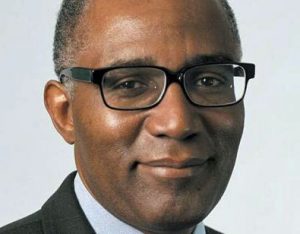
Trevor Phillips
His comments were condemned as “irresponsible” and “derogatory” by some senior Muslims, but supported by Trevor Phillips, then chair of the Commission for Racial Equality.
In another lecture Bell said: “We can choose … whether we want to bring our diversity together in a single rainbow or whether we allow our differences to fester into separate cultures and separate communities.”
Phillips came to the conclusion that increasing self-segregation of British communities along ethnic and religious lines was a major threat to national integration and to Enlightenment values. Young people were being brought up with insufficient awareness of these values, in closed communities where extremism could fester.

David Miliband
Ken Livingstone, then Mayor of London, attacked Phillips for “pandering to the right”. During a televised discussion, the prominent Labour Minister David Miliband shook his head and described Phillips’s remarks about community segregation as “fatuous”.
Since then, Phillips’s concerns about social segregation in British communities have been vindicated by several experts, while other evidence indicates a small amount of progress. Even the most optimistic reading of the evidence suggests a serious and enduring problem.
On faith schools, the Casey report noted their role in institutionalising segregation:
“The Government had attempted to alter the segregation of pupils in faith schools by introducing admissions criteria for new faith-based Free Schools. But these did not seem to be having an impact on the diversity of minority faith schools … [their] admission policies do seem to play a role in reinforcing ethnic concentrations.”
But Casey did not take the final step. She wrote: “ending state support for all faith schools would be disproportionate”. But how serious do the problems have to become before it becomes proportionate?
Rather than relying on failed palliatives, state-funded faith schools should be phased out. Taxpayers should not subsidise religion: religion and the state should part company.
A recent poll found that an overwhelming majority of the British public opposed religious discrimination in faith school admissions. Making all faith schools non-discriminatory in terms of religion would be a big positive step.
Fostering extremism
Ed Husain was born and educated in Britain, where he obtained a Master’s Degree. He was drawn toward extreme versions of Islam and was persuaded that Western democracies are irredeemably corrupt and must be replaced by a theocracies based on Islamic law.
 After several years he renounced his former extremism, but retained his Islamic faith. In an interview he revealed the segregated life of his upbringing:
After several years he renounced his former extremism, but retained his Islamic faith. In an interview he revealed the segregated life of his upbringing:
“The result of 25 years of multiculturalism has not been multicultural communities. It has been mono-cultural communities. Islamic communities are segregated. Many Muslims want to live apart from mainstream British society; official government policy has helped them do so. I grew up without any white friends. My school was almost entirely Muslim. I had almost no direct experience of ‘British life’ or ‘British institutions’.” (Quoted in Cohen 2007, p. 378.)
British policy-makers have welcomed diversity. But they have defined needs and rights via the ethnic categories into which people were placed, using those divisions to shape public policy. The result has been a more fragmented society, which has nurtured extremism.
In the name of multi-culturalism, Britain has become a more divided society, where inclusive, universal, Enlightenment values are often side-lined or unknown. These communal enclaves, found in France and Belgium as well as Britain, have become hothouses for violent extremism.
Hassan Butt was born in Luton in England in 1980. In 2000 he travelled to Pakistan and worked for the Taliban and other jihadists against the West. Subsequently he renounced his anti-Western views.
Butt explained that “Islamic theology, unlike Christian theology, does not allow for the separation of the state and religion … [they] are considered to be one and the same.” Consequently, since there no righteous Islamic state is deemed to exist, the extremists have “declared war on the whole world”.
 Some on the Far Left disowned Butt for betraying the struggle against “Western imperialism”. He was also criticized by one member of the “Stop the War” movement, who is a leading supporter of the Muslim Brotherhood, for his “call to change the face of Islam” (Cohen 2007, pp. 371-2).
Some on the Far Left disowned Butt for betraying the struggle against “Western imperialism”. He was also criticized by one member of the “Stop the War” movement, who is a leading supporter of the Muslim Brotherhood, for his “call to change the face of Islam” (Cohen 2007, pp. 371-2).
Butt’s response was clear: “I believe that the issue of terrorism can be easily demystified if Muslims and non-Muslims start openly to discuss the ideas that fuel terrorism.” However, many on the Left, as well as the Right, are not helping this process.
British values?
Successive British Prime Ministers have reacted to the threat of Islamist extremism by calling for “British values”. After claims that some schools in Birmingham were promoting Islamist extremism, in 2014 the Conservative Prime Minister David Cameron outlined plans to put the promotion of “British values” at the heart of the national curriculum for schools. This is now official policy:
“Schools should promote the fundamental British values of democracy, the rule of law, individual liberty, and mutual respect and tolerance of those with different faiths and beliefs.”
 But the official government document outlining this policy mentions respect and tolerance for other races but fails to mention discrimination against women or gays. It rightly mentions the freedom to “choose and hold” any faith, but not the freedom to exit a religion without sanction. It mentions “individual liberty” only once, and fails to uphold freedom of non-violent expression, including when it may cause offence.
But the official government document outlining this policy mentions respect and tolerance for other races but fails to mention discrimination against women or gays. It rightly mentions the freedom to “choose and hold” any faith, but not the freedom to exit a religion without sanction. It mentions “individual liberty” only once, and fails to uphold freedom of non-violent expression, including when it may cause offence.
Are these omissions an accident, or are they designed not to offend a particular religious minority?
 Another problem here is not the values as such, but their nationalistic description as “British”. Democracy was not invented in Britain: Ancient Athens and Viking Iceland have much earlier precursors. The US and France have much earlier claims to the values of liberty and religious tolerance. Britain legally discriminated against Protestant nonconformists and Catholics until the nineteenth century, and it still bars any Catholic from becoming its sovereign.
Another problem here is not the values as such, but their nationalistic description as “British”. Democracy was not invented in Britain: Ancient Athens and Viking Iceland have much earlier precursors. The US and France have much earlier claims to the values of liberty and religious tolerance. Britain legally discriminated against Protestant nonconformists and Catholics until the nineteenth century, and it still bars any Catholic from becoming its sovereign.
Apart from being misleading and inaccurate, the label of “British values” would hardly be effective in preventing a young Muslim from being radicalised. On the contrary, the label can help bolster the misperception that Britain and the rest of the West are at war against Islam. This nationalistic labelling readily allows the distortion that “British values” are being promoted by the UK authorities in a global effort to counter Islam.
It would be more accurate and effective to label values such as democracy, the rule of law, individual liberty, and freedom of worship as “universal values” or “Enlightenment values”. They are not simply values that British residents and citizens should adopt. Other countries should promote these values too.
Islamophobia?
Polly Toynbee is a leading progressive, and vigilantly anti-racist, British journalist. Yet in 2004 she was proclaimed by the Islamic Human Rights Commission as the winner of their “Most Islamophobic Media Personality” award.

Polly Toynbee
In her words, she received this ridiculous appellation because she “had challenged the legitimacy of the idea of Islamophobia and warned of the danger to free speech of trying to make criticism of a religion a crime akin to racism.” She rightly noted that the “occasional note of reason from moderate Islamic groups is so weak it hardly makes itself heard”. She highlighted the difficulties involved in starting a serious dialogue on this issue.
The failure to distinguish racism from criticism of religion sadly remains widespread. Many on the Left have done excellent work since the 1970s in campaigning against racism, fascism and discrimination. But the frequent confusion of criticism of religion with racism has diverted their efforts.
It must be repeated that concerns about Islam as a belief system are not equivalent to bigotry toward Muslims. Racism and persecution of Muslims are serious problems and should be vigilantly opposed. But the option to criticise Islam, or any other belief system, is an important right, and it should be protected.
The term “Islamophobia” is partly to blame. Despite widespread usage, it is rarely defined and there is no consensus on its definition.
Does it literally mean fear of Islam? Or criticism of Islam? Or hatred of Islam? Or persecution of Muslims? Its intended meaning can range from scholarly criticism of Islamic doctrines to racist acts against ethnic groups who are Muslim. These are obviously very different. Yet they are all lumped together under the same label.
“Anti-Muslim prejudice” or “anti-Muslim discrimination” would be much better terms. They accurately describe this very real and sadly widespread problem.
Criticism of religion can be enlightening – indeed a part of Enlightenment (and British) values, from Voltaire to Bertrand Russell. We should also be free to criticise Sharia law, as we are free to criticise other laws.

Justin Welby
As Archbishop of Canterbury Justin Welby pointed out recently, there also needs to be a discussion about the doctrinal links between religion and extremism:
“This requires a move away from the argument that has become increasingly popular, which is to say that ISIS is nothing to do with Islam, or that Christian militia in the Central African Republic are nothing to do with Christianity, or Hindu nationalist persecution of Christians in South India is nothing to do with Hinduism.”
Extreme and draconian statements can be found in the Old Testament of the Bible as well as in the Qur’an. Believing that they are obeying the word of God, these texts have spurred violent religious extremists, as we are all sadly aware.
Nevertheless, many modern Christians, Jews and Muslims have accepted the power of state law over religious law. They obey the laws of their country. They do not kill homosexuals (Leviticus 20:13), or slay apostates (Deuteronomy 13:6-10), or stone to death a bride who is not a virgin (Deuteronomy 22:20-21), or rape non-Muslim women (Qur’an 23:1-6, 70:22-30), or make war on unbelievers (Qur’an 8:12, 9:5, 9:73, 9:123).
We must help this vital transition from regressive religious law, toward a recognition of modern secular law and democracy. But we do not do so by pretending it is not needed, or refusing to discuss it, or branding those that discuss it as “Islamophobic”.
Signs of hope
On a more positive note, the authors of the 2007 Policy Exchange Report argued for a change of approach. The government and others “should stop emphasising difference and engage with Muslims as citizens”.
Policies of “group rights or representation” for specific Islamic communities are likely to alienate other sections of the Muslim population further. These well-informed remarks went against much of the then-current local and national government policy.
The authors continued: “The exaggeration of Islamophobia does not make Muslims feel protected but instead reinforces feelings of victimisation and alienation.” They also called for “a broader intellectual debate in order to challenge the crude anti-Western, anti-British ideas that dominate cultural and intellectual life. This means allowing free speech and debate, even when it causes offence to some minority groups.”
We need to be honest. Extremist religions of all kinds can threaten liberal, democratic and Enlightenment values. Christianity in particular has been violently repressive and brutal. Some religious sects today are fanatical and intolerant.
These issues need to be openly discussed, in a civilised manner. They should not be swept under the carpet by those on the Regressive Left who act as if they do not understand the difference between race and religion, or would shut down critical discussion of a religion because it might be wrongly construed by others as an attack on a minority, or by other politicians of any stripe who are simply too scared to take the issue on.
In an immensely positive development, the “Muslim Reform Movement” was launched in 2015. In their inaugural statement they defended freedom of speech, gender equality, a secular state and the UN Declaration of Universal Human Rights. They noted explicitly that freedom of speech included the right to criticize Islam: “Ideas do not have rights. Human beings have rights.”
By contrast, the blanket and ill-defined leftist rhetoric of “Islamophobia” does not help those Muslims who are struggling to reform and modernise their religion. Instead, the more conservative leaders of Muslim communities protect their regressive and reactionary views behind its smokescreen. Modernising Muslims are thus impaired by an unwitting coalition of leftists and Muslim conservatives.
Responsibility lies on both sides. In a climate of open discussion, we all need to be vigilant against acts of hatred or violence against Muslims and other minorities.
Initiatives to preserve liberal values in a multi-faith and multi-ethnic world should be welcomed. In addition, the Left needs to re-establish its links with the Enlightenment and its project to separate church from state. Within any society, freedom of worship should be protected, as well as the freedom to criticise religion.
Inward-looking, unreforming, dogmatic religion is a major barrier to assimilation. The Left needs to learn that lesson, and to encourage open discussion of the issues involved.

6 December 2016
Edited 7th and 10th December 2016, with thanks to Andrew Ross. Further edit, 23 January 2017.
|
My forthcoming book elaborates on some of the political issues raised in this blog:
Wrong Turnings: How the Left Got Lost
To be published by University of Chicago Press in November 2017
|
References
Accord Coalition (2016) ‘Public overwhelmingly opposes religious discrimination in faith school admissions’, Accord, 2 November. http://accordcoalition.org.uk/2016/11/02/public-overwhelmingly-opposes-religious-discrimination-in-faith-school-admissions/
Asthana, Anushka and Nazia Parveen (2016) ‘Call for action to tackle growing ethnic segregation across UK’, The Gaurdian, 1 November. https://www.theguardian.com/society/2016/nov/01/call-for-action-to-tackle-growing-ethnic-segregation-across-uk
Asthana, Anushka and Peter Walker (2016) ‘Casey review raises alarm over social integration in the UK’, The Guardian, 5 December. https://www.theguardian.com/world/2016/dec/04/social-integration-louise-casey-uk-report-condemns-failings
BBC News (2001) ‘MP calls for English tests for immigrants’, 17 July. http://news.bbc.co.uk/1/hi/uk/1436867.stm
Bell, David (2005) ‘Full Text of David Bell’s Speech’, The Guardian, 17 January. http://www.theguardian.com/education/2005/jan/17/faithschools.schools
Board of Deputies of British Jews (2016) ‘Board of Deputies statement on meeting with Leader of the Opposition Jeremy Corbyn’, 9 February. https://www.bod.org.uk/board-of-deputies-statement-on-meeting-with-leader-of-the-opposition-jeremy-corbyn/
Butt, Hassan (2007) ‘My plea to fellow Muslims: You must renounce terror’, The Observer, 1 July. http://www.theguardian.com/commentisfree/2007/jul/01/comment.religion1
Casey, Louise (2016) ‘The tough questions on social integration are being ducked’, The Observer, 4 December. https://www.theguardian.com/commentisfree/2016/dec/04/tough-questions-social-integration-laws-values-every-person-britain
Cohen, Nick (2007) What’s Left? How the Left Lost its Way (London and New York: Harper).
Department of Education (2014) Promoting Fundamental British Values as Part of SMSC in Schools (London: Department of Education). https://www.gov.uk/government/uploads/system/uploads/attachment_data/file/380595/SMSC_Guidance_Maintained_Schools.pdf
Department for Communities and Local Government (2016) The Casey Review: A review into opportunity and integration (London: Department for Communities and Local Government). https://www.gov.uk/government/uploads/system/uploads/attachment_data/file/574565/The_Casey_Review.pdf
Dobson, Roger (2014) ‘British Muslims face Worst Job Discrimination of any Minority Group, According to Research’, The Independent, 30 November. http://www.independent.co.uk/news/uk/home-news/british-muslims-face-worst-job-discrimination-of-any-minority-group-9893211.html
Gillard, Derek (2007) Never Mind the Evidence: Blair’s Obsession with Faith Schools www.educationengland.org.uk/articles/26blairfaith.html
Greer, Germaine (1999) The Whole Woman (New York: Doubleday).
Hodgson, Geoffrey M. (2017) Wrong Turnings: How the Left Got Lost (Chicago: University of Chicago Press, forthcoming).
Husain, Ed (2007) The Islamist: Why I Joined Radical Islam in Britain, What I Saw Inside, and Why I Left (London Allan Lane).
Hussain, Dilly (2015) ‘How “British Values” are used as a Smoke Screen for Anti-Muslim Government Policies’, Stop the War Coalition, 15 June. Formerly http://www.stopwar.org.uk/news/how-british-values-are-used-as-a-smokescreen-for-anti-muslim-government-policies. Now unavailable.
Kinnock, Stephen (2016) ‘How to build an inclusive and patriotic view of Britishness’, Labour List, 2 December. https://labourlist.org/2016/12/kinnock-how-to-build-an-inclusive-patriotic-and-confident-view-of-britishness/
Malik, Kenan (2005) ‘The Islamophobia Myth’, Prospect, February. http://www.kenanmalik.com/essays/prospect_islamophobia.html
Mirza, Munira, Senthilkumaran, Abi and Ja’far, Zein (2007) Living apart Together: British Muslims and the Paradox of Multiculturalism (London: Policy Exchange), https://policyexchange.org.uk/publication/living-apart-together-british-muslims-and-the-paradox-of-multiculturalism
Mortimer, Caroline (2016) ‘Justin Welby: It’s time to stop saying Isis has ‘nothing to do with Islam’”, The Independent, 19 November. http://www.independent.co.uk/news/people/isis-nothing-to-do-with-islam-justin-welby-archbishop-canterbury-religion-a7427096.html
National Secular Society (2015c) ‘Muslim Reform Movement Embraces Secularism and Universal Human Rights’, National Secular Society, 8 December. http://www.secularism.org.uk/news/2015/12/muslim-reform-movement-embraces-secularism-and-universal-human-rights
Portes, Jonathan (2012) ‘Inching towards integration?, National Institute of Economic and Social Research, 5 March. http://www.niesr.ac.uk/blog/inching-towards-integration#.WEglE01vicx
Sides, John (2015) ‘New research shows that French Muslims experience extraordinary discrimination in the job market’, The Washington Post, 23 November. https://www.washingtonpost.com/news/monkey-cage/wp/2015/11/23/new-research-shows-that-french-muslims-experience-extraordinary-discrimination-in-the-job-market/
Toynbee, Polly (2004) ‘We Must be Free to Criticise without Being Called Racist’, The Guardian, 18 August. http://www.theguardian.com/world/2004/aug/18/religion.politics
Travis, Alan (2016) ‘Mass EU migration into Britain is actually good news for UK economy’, The Guardian, 18 February. https://www.theguardian.com/uk-news/2016/feb/18/mass-eu-migration-into-britain-is-actually-good-news-for-uk-economy
White, Michael (2015) ‘Trevor Phillips says the Unsayable about Race and Multiculturalism’, The Guardian, 16 March 2015. http://www.theguardian.com/uk-news/2015/mar/16/trevor-phillips-race-multiculturalism-blog
Posted in Assimilation, Christianity, Democracy, Donald Trump, Immigration, Islam, Judaism, Labour Party, Left politics, Liberalism, Populism, Religion, Right politics
November 18th, 2016 by geoffhodgson1946

Geoffrey M. Hodgson
“One of the most important essays you will read in 2016” @Rokewood
What caused the election of Donald Trump? I am deeply dissatisfied by some of the quick answers to this question.
The leader of Her Majesty’s Opposition had an instant answer. Jeremy Corbyn blamed the left’s association “with the forces of globalisation during the Obama administration”. Instead, he insisted, we need to reject “that free market, economic thinking, which processed deindustrialisation in Britain”.

Naomi Klein
Others used different words on the same “free market” theme. Naomi Klein put it bluntly: “the force most responsible” for Trump’s success was “neoliberalism”. This worldview, “fully embodied by Hillary Clinton and her machine”, was “no match for Trump-style extremism.”
Trump won over US voters because: “Under neoliberal policies of deregulation, privatisation, austerity and corporate trade, their living standards have declined precipitously.”
The Guardian columnist George Monbiot followed with a historical piece, claiming that “the events that led to Donald Trump’s election started in England in 1975”, when Margaret Thatcher embraced the free-market “neoliberal” philosophy of Friedrich Hayek. This was a harbinger of the global rise of free-market thinking that allegedly wrought havoc in recent years.
Both Klein and Monbiot argue that Trump capitalised on the failure of other politicians to deal with the adverse effects of neoliberalism.
There is no doubt that the global expansion of capitalism in recent decades has been hugely disruptive, shifting millions of manufacturing jobs to East Asia. In the absence of adequate retraining and investment, it has led to declining opportunities for large swathes of the working population in North America and Europe.
Trump tapped into working class discontent. In important respects his policies are not neoliberal, by any reasonable definition of that term. In his campaign, Trump used anti-neoliberal, protectionist slogans such as high import tariffs and closed borders.

George Monbiot
But why did it take so long for people to react to “neoliberalism” and vote in this way? As Monbiot argued, the current so-called “neoliberalism” got under way in the 1970s. It accelerated after the beginning of economic reform in China in 1978 and after the fall of the Berlin Wall in1989. The whole world was then opened up for trade.
But while right-populist movements had emerged, they were then far from power. Tony Blair won a landslide election in 1997 and increased public spending on welfare, education and health. Three years after Blair had won a third election, the United States elected its first black President.
If neoliberalism and stagnant living standards had been around since the 1970s, then why did it take 40 years for a Trump-like demagogue to be elected? The political wind swung decisively to the right more recently, after the Great Crash of 2008.
But it is also difficult to explain Trump’s populist success as a targeted reaction to the financial crash. The removal of some banking regulations, by Bill Clinton in the US and Gordon Brown in the UK, did exacerbate the lending boom that led to the crash of 2008.
Yet, despite his protectionism, Trump offers still more deregulation. He is not targeting the bankers as part of the “elite”. On the contrary, he has pledged to repeal the Dodd-Frank Act, which was designed to curb some of the excesses of the financial sector. As Larry Elliott put it: “This looks curious for someone trying to surf a tidal wave of populist anger against the bankers.”
 Putting the blame on “neoliberalism” underestimates the way in which outsiders such as Trump and Farage have created populist movements that blame “the elite” and offer simplistic solutions, such as to “curb immigration”. Blaming “neoliberalism” underestimates the pernicious influences of racism and anti-Muslim prejudice. Simplistic economic explanations of Trump’s victory ignore much stronger evidence of other factors at work.
Putting the blame on “neoliberalism” underestimates the way in which outsiders such as Trump and Farage have created populist movements that blame “the elite” and offer simplistic solutions, such as to “curb immigration”. Blaming “neoliberalism” underestimates the pernicious influences of racism and anti-Muslim prejudice. Simplistic economic explanations of Trump’s victory ignore much stronger evidence of other factors at work.
The Pavlovian leftist response of blaming markets or “neoliberalism” for “all our problems” is far off the mark.
What is neoliberalism?
Monbiot is keen to identify “neoliberals” such as Hayek as the villains. According to Monbiot:
“Neoliberalism sees competition as the defining characteristic of human relations. … Tax and regulation should be minimised, public services should be privatised. The organisation of labour and collective bargaining by trade unions are portrayed as market distortions that impede the formation of a natural hierarchy of winners and losers. Inequality is recast as virtuous: a reward for utility and a generator of wealth, which trickles down to enrich everyone.”
I shall pass over the many flaws in the essay from which the above passage is quoted. Monbiot conflates the different views of Ludwig von Mises, Friedrich Hayek and Milton Friedman, and he is inaccurate on several details. Note also that Monbiot does not highlight deregulation of the financial sector in this passage.
After taking on board Monbiot’s definition of neoliberalism, let us consider the extent to which it has been achieved in the real world.
Has neoliberalism been achieved in practice?
Monbiot described how in the 1970s “elements of neoliberalism, especially its prescriptions for monetary policy, were adopted by Jimmy Carter’s administration in the US and Jim Callaghan’s government in Britain.” He is unclear on the details, but presumably in part he refers to Callaghan’s embrace of monetarist ideas from 1976 to 1979.

Milton Friedman
Monetarism, incidentally, is not obviously the same as neoliberalism. While monetarists such as Friedman were free-marketeers, monetarism’s central claim is that the main cause of inflation is the rise in the money supply – a thesis that (as Friedman himself recognised) could also apply to a planned economy. Indeed, this central monetarist tenet was adopted by some Marxist economists.
“After Margaret Thatcher and Ronald Reagan took power, the rest of the [neoliberal] package soon followed: massive tax cuts for the rich, the crushing of trade unions, deregulation, privatisation, outsourcing and competition in public services.”
He is right. Albeit to different degrees in different countries, these things happened.
But go back to Monbiot’s checklist definition of neoliberalism, as quoted above. He saw neoliberalism as minimising “tax” not simply “tax cuts for the rich”. Has this happened?

Ronald Reagan & Margaret Thatcher
Margaret Thatcher reduced taxation for the rich. But the overall tax burden (all taxes as a percentage of GDP) rose during her period of office. This figure fell in the 1990s and has fluctuated from 1997 in a range between 35 per cent and 38 per cent of GDP. The UK austerity governments since 2010 have not reduced the overall tax take significantly.
Similarly, Ronald Reagan began by cutting income taxes for the rich, but ended his eight-year term of office with a Federal percentage tax take almost identical to that of his predecessor Jimmy Carter, and slightly above the average for the entire 1970-2009 period.
The “neoliberal” mission of massive overall tax cuts was not achieved under Thatcher or Reagan, or under subsequent administrations. Put in a longer historical perspective, taxation and public spending in the UK and USA today are much higher than they were before the Second World War.
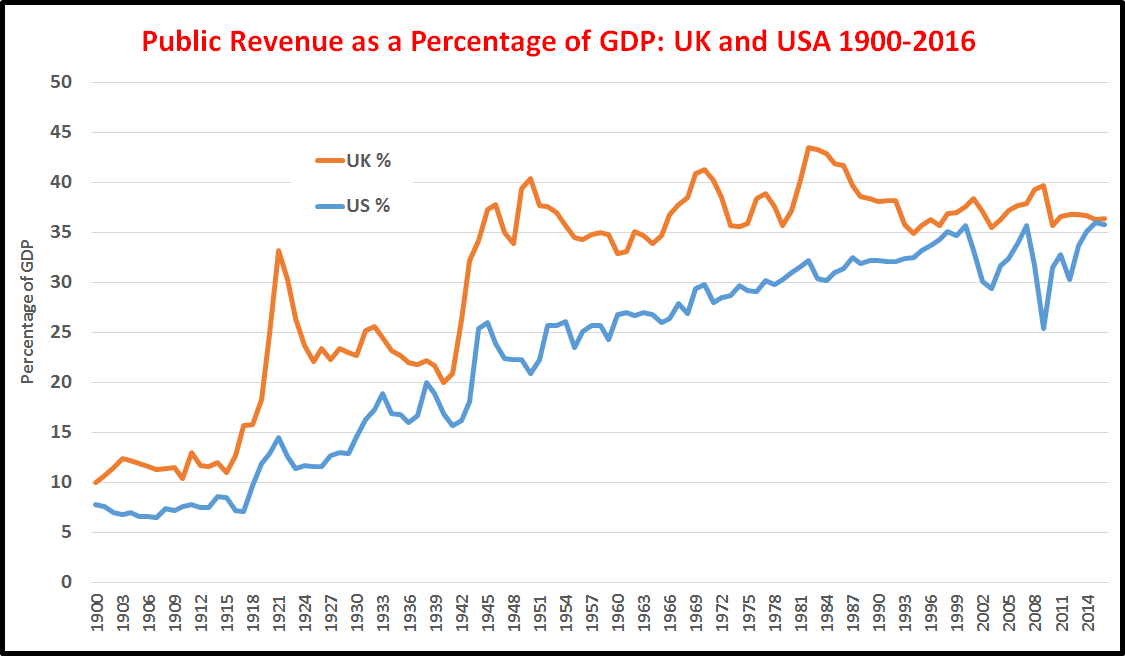
The above figure shows the tax revenues, from national, state and local government combined, for the UK and the USA from 1900 to 2016. The alleged era of “neoliberalism” from the 1970s has not been associated with declining tax revenues. If anything, the “neoliberal” era of a minimal state was pre 1914, not post-1975.
What is characteristic of fiscal policy in the UK and USA is not the alleged “neoliberal” overall reduction of taxation but a lightening of taxation on the rich, and a failure to redistribute sufficiently, in the face of widening inequality.
Klein is probably right to suggest: “A good chunk of Trump’s support could be peeled away if there were a genuine redistributive agenda on the table.” But she, with Corbyn and Monbiot, are wrong to chime in with the crude anti-market mantras that have disabled the Left for 180 years. In building a redistributive agenda we must look to Thomas Paine, rather than Robert Owen or Karl Marx.
Privatisation: against dogma
By contrast, Monbiot’s other point, about growing privatisation since the 1970s, has been borne out by the evidence. In the UK, USA and much of the world there has been massive privatisation and outsourcing of public services.
 Unlike any false claim that “neoliberalism” has reduced overall taxes, the increase of privatisation is manifest. In addition, it has sometimes led to deleterious consequences including lower pay for workers and a reduced quality of services.
Unlike any false claim that “neoliberalism” has reduced overall taxes, the increase of privatisation is manifest. In addition, it has sometimes led to deleterious consequences including lower pay for workers and a reduced quality of services.
But Corbyn and Monbiot speak and write as if privatisation is necessarily bad – always and everywhere it is seen as a negative policy. This doctrinaire stance simply inverts the claim of the crudest free marketeers, who claim that state provision is always bad and that private provision is always good. The Corbyn-Monbiot stance simply turns this upside-down. It is equally dogmatic. It is based on ideology, not evidence.
Regarding markets as always bad, amounts to agoraphobia or fear of markets (from the Greek words agora for market, and phobia for fear). This is an inversion of the kratophobia of the free-marketeers – a fear of government or of the state.
Instead of these ideologically-driven, simplistic positions, it is necessary to be more pragmatic. Some privatisations work. Others do not. Some state provision is effective. Some is wasteful and inefficient. We need to look at individual cases to understand why.
There are many case studies to look at and they are too wide-ranging to be reviewed here. A good start would be to look at an important early article on privatisation by John Goodman and Gary Loveman in the Harvard Business Review. They wrote:
“the issue is not simply whether ownership is private or public. Rather, the key question is under what conditions will managers be more likely to act in the public’s interest … managerial accountability to the public’s interest is what counts most, not the form of ownership.”
Goodman and Loveman argued that profits and the public interest overlap best when the privatised organisation is in a competitive market. Competition from other companies can discipline managerial behaviour. Consequently, there is little point in privatisation if competition is lacking.
Subsequent research has shown that other factors are involved as well. Instead of being driven by dogma, we need to be pragmatic and experimental, taking account of research.
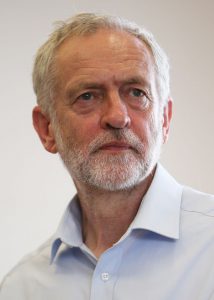
Jeremy Corbyn
You may respond that Corbyn is pragmatic, because he has declared that he is in favour of a mixed economy: he accepts a private as well as a public sector. But notice the imbalance in his presentations. He treats public provision as ideal, and the private sector as an expedient to be tolerated, at least for a while.
Corbyn says he accepts a mixed economy, but he has offered has no defence of private sector. His “mixed economy” could be a stopping point on the road to a fully-socialist planned economy, where private enterprise is pushed to the side-lines.
Declining public provision?
 Ken Loach’s moving film, I, Daniel Blake, portrays the heart-breaking human consequences of the UK Conservative government’s shredding of the welfare safety net for the poor. Attempts to reduce public spending in many countries have led to millions of human tragedies like this.
Ken Loach’s moving film, I, Daniel Blake, portrays the heart-breaking human consequences of the UK Conservative government’s shredding of the welfare safety net for the poor. Attempts to reduce public spending in many countries have led to millions of human tragedies like this.
Doctrinaire austerity policies – which fail in their own terms because they depress economic demand for goods and services and create more unemployment – have been adopted by many governments and imposed by the European Union.
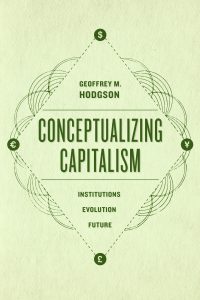 All this is real, and tragic. Millions have suffered because of such misguided policies. But we should not jump to the conclusion that “neoliberalism” has been successful in moving toward a minimal economic role for the state.
All this is real, and tragic. Millions have suffered because of such misguided policies. But we should not jump to the conclusion that “neoliberalism” has been successful in moving toward a minimal economic role for the state.
In my book Conceptualizing Capitalism I examined differences and changes in public social spending in different developed countries from 1980 to 2005, using OECD data. The principal components of public social spending include health services, old age benefits, unemployment benefits, incapacity-related benefits, family support, active labour market public programs, and housing benefits.
Amounts of public spending as percentages of GDP (in 1980 and 2005) are shown below.
|
1980 |
2005 |
change |
| Australia |
10.3 |
16.5 |
+6.2 |
| Austria |
22.4 |
27.1 |
+4.7 |
| Belgium |
23.5 |
26.5 |
+3.0 |
| Canada |
13.7 |
16.9 |
+3.2 |
| Denmark |
24.8 |
27.7 |
+2.9 |
| Finland |
18.1 |
26.2 |
+8.1 |
| France |
20.8 |
30.1 |
+9.3 |
| Germany |
22.1 |
27.3 |
+5.2 |
| Italy |
18.0 |
24.9 |
+6.9 |
| Japan |
10.2 |
18.5 |
+8.3 |
| Netherlands |
24.8 |
20.7 |
–4.1 |
| Norway |
16.9 |
21.6 |
+4.7 |
| Portugal |
9.9 |
23.0 |
+13.1 |
| Spain |
15.5 |
21.1 |
+5.6 |
| Sweden |
27.1 |
29.1 |
+2.0 |
| Switzerland |
13.8 |
20.2 |
+6.4 |
| UK |
16.5 |
20.5 |
+4.0 |
| US |
13.2 |
16.0 |
+2.8 |
Public Social Spending as Percentage of GDP in Selected Countries
Most countries increased their public social spending, during a period when the ideology of privatization was resurgent. The Netherlands is an exception. Note that the increases in public social spending are not explained by rises in unemployment benefit, because generally this comprises a small proportion of public social spending.
Of course, it needs to be emphasised that there is an ideologically-driven agenda that has led to deep cuts in some welfare and has been gravely damaging for the poor. But we are far from re-entering the era of the minimal state.
Pursuing unicorns
Much of the hysteria against “neoliberalism” draws from the Left’s deep rooted antipathy to markets. Let’s briefly address this.
First, they may be alternatives to markets in modern, large-scale economic systems but they would greatly out-do the miseries inflicted on the fictional Daniel Blake and his millions of real-world counterparts.
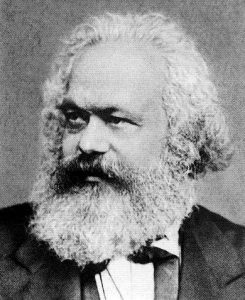
Karl Marx
Every attempt to get rid of markets, since Robert Owen and Karl Marx proclaimed their redundancy in the nineteenth century, has led to famine, repression and the termination of democracy. Look to Stalin’s Russia, Mao’s China, Cambodia, Cuba and Venezuela. Twentieth-century Communism resulted in over 90 million deaths.
In the light of twentieth-century experience it would be worse than foolhardy to make yet another attempt to minimise markets, or as Klein oddly put it, “corporate trade”.
A better way is possible, but it involves taming and supplementing markets, not repressing them. It means regulating corporations, not casting them as sorcerers of evil. But sadly, agoraphobia still afflicts many on the left.
“It seems to me that the questions we urgently need to ask ourselves are these: is totalitarianism the only means of eliminating capitalism? If so, and if … we abhor totalitarianism, can we continue to call ourselves anti-capitalists? If there is no humane and democratic answer to the question of what a world without capitalism would look like, then should we not abandon the pursuit of unicorns, and concentrate on capturing and taming the beast whose den we already inhabit?”
Excellent. But since then he has gone down the rocky road of blaming “neoliberalism” for “all our problems”. Without defending some role for private property or markets, he thereby allies himself with the many leftists who now describe anyone defending private property or markets as “neoliberal”.
Has Monbiot now abandoned the idea of taming the capitalist beast? Does he wish to kill it instead?
In April 2016 he wrote: “Every invocation of Lord Keynes is an admission of failure.” So he junked the best macroeconomic theory we have for limiting some of the excesses of capitalism. His grounds for doing so were these:
“Keynesianism works by stimulating consumer demand to promote economic growth. Consumer demand and economic growth are the motors of environmental destruction.”

John Maynard Keynes
Wrong. “Consumer demand and economic growth” can destroy the planet, but only if that demand and growth relate to non-renewable material resources. Much demand and growth in modern economies is for services. Intangible assets now make up much of corporate wealth. For example, there are demands for information and education, and such services are added to GDP. There is no necessary reason why economic growth in a modern information-rich economy should ruin the planet. Keynes is still relevant.
Those that have pursued unicorns have imagined that it is possible to design a better system than capitalism. Monbiot says the same, declaring that for the Left
“the central task should be to develop an economic Apollo programme, a conscious attempt to design a new system, tailored to the demands of the 21st century.”
This puts him in full, unicorn-chasing mode. One of the biggest mistakes by early socialists was to ignore the massive complexity of modern economic systems and attempt to “design a new system” at the behest of some utopian dreamer.
Instead, what is required is careful, incremental, experimental change, retaining the flexibility and devolved autonomy afforded by widespread private property. This autonomy allows for multiple experiments and deeper learning from mistakes.
While state intervention is necessary, no complete or adequate overall “design” is possible, because of the way much knowledge is irretrievably dispersed throughout the economy. The economies of the twenty-first century are more knowledge-intensive than those before. Hence the possibilities of comprehensive central planning or “design” are even more limited.
Neoliberalism and economic man
“as modern psychology and neuroscience make abundantly clear – human beings, by comparison with any other animals, are both remarkably social and remarkably unselfish. The atomisation and self-interested behaviour neoliberalism promotes run counter to much of what comprises human nature.”
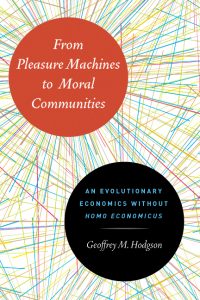 The first sentence is valid and important. The second is simplistic. As I elaborate in my book From Pleasure Machines to Moral Communities, strong evidence from psychology, evolutionary biology and primatology shows that the picture of self-seeking “economic man”, which dominated mainstream economics until recently, is deeply flawed.
The first sentence is valid and important. The second is simplistic. As I elaborate in my book From Pleasure Machines to Moral Communities, strong evidence from psychology, evolutionary biology and primatology shows that the picture of self-seeking “economic man”, which dominated mainstream economics until recently, is deeply flawed.
But that does not mean that we can or should get rid of markets. Our capacities for cooperation evolved culturally and genetically because our ancestors hunted and foraged in groups, rarely numbering more than 200 individuals, for millions of years. Relying on emotions and facial expressions, we developed sophisticated social mechanisms to engender trust and cooperation, and to enforce social rules.
As larger-scale cities emerged about 14,000 years ago, these face-to-face mechanisms could no longer be relied upon exclusively to regulate social interactions. Institutions such as law, property and contract were developed to deal with these more impersonal, non-familial, transactions.
Every human civilisation that has developed has relied on property, trade and contracts. These require different enforcement mechanisms, but they too require measures of trust and moral obligation, as Adam Smith made clear in his Theory of Moral Sentiments. The idea that markets inevitably corrode away all social ties is mistaken.
Even the Soviet-style economies of the twentieth century relied on some private property and trade. They failed because state bureaucracy stifled autonomy and innovation. China grew rapidly when it expanded the private sector after 1978.
Of course, the spread of the market would be detrimental if it invaded all our social relations, attempting to put prices on love and friendship and reducing everything else to money transactions. But a system of private property provides a degree of autonomy that is required to maintain non-market interactions at home and at work. Successful corporations create islands of cooperation and teamwork within their organisational boundaries.
 Impersonal relations occur in bureaucracies as well as in markets. Large-scale systems of national planning also make much interaction impersonal. People become atomised; they become numbers, to be processed by bureaucrats and computers.
Impersonal relations occur in bureaucracies as well as in markets. Large-scale systems of national planning also make much interaction impersonal. People become atomised; they become numbers, to be processed by bureaucrats and computers.
The experience of centrally-planned economies in Russia, China and Eastern Europe shows that systems of state planning can be cesspits of human alienation and corruption, governed impersonally by disillusioned bureaucrats and corrupt state officials. I recommend the film The Lives of Others for a glimpse into that dark world.
Abandoning neoliberalism
I have written at further length elsewhere on the limits to markets. I accept Hayek’s explanation that comprehensive overall planning is dysfunctional. But I do not accept that everything should or can become a monetary transaction in its place.
Indeed, the growing use of information in a capitalist economy puts limits on the role of information as property. Furthermore, the very freedom of waged employees means that there are constraints on entering into contracts for future work. There are limited futures markets for labour. For such reasons, capitalism can never be a 100 per cent market system.
Hayek failed to acknowledge fully the limits to markets. Such free marketeers are the mirror-image of socialists who fail to acknowledge adequately that there are limits to common ownership. We have to transcend both agoraphobia and kratophobia.
Agoraphobics react adversely to any tolerance of markets. Hence economic interventionists such as Tony Blair, and supporters of public healthcare such as Hillary Clinton, have recently and frequently been accused of being neoliberals. This is misleading and absurd.
As Colin Talbot has pointed out, “neoliberalism” has become “a term of abuse” to be used against “any type of pro-market reform or political position that recognizes markets may – in the right circumstances – be a good thing”. Consequently, everyone “from moderate social democrats to the most lurid free-marketeers gets lumped together under a convenient ‘neoliberal’ label.”
In a brilliant survey of its usage since the 1980s, Rajesh Venugopal concluded that “neoliberalism has become a deeply problematic and incoherent term that has multiple and contradictory meanings, and thus has diminished analytical value.”
Some may wish to retain the “neoliberal” label, to apply it to those free marketeers who attempt to shrink radically the size of the state, and to privatise anything that walks. The definition could be further sharpened by adding advocacy of economic austerity. It could also could be sharpened by including deregulation of the financial sector.
 But such nuances have been lost in a global storm of “neoliberal” accusations. Klein and Monbiot have added some force and authority to this widening tempest.
But such nuances have been lost in a global storm of “neoliberal” accusations. Klein and Monbiot have added some force and authority to this widening tempest.
They do not confine their accusations to the likes of Hayek. Most seriously, they pointed the “neoliberal” finger at Hillary and Bill Clinton, as Corbyn made the “forces of globalisation” jibe at Barack Obama.
If it means anything, neoliberalism is an ideology and only partly a reality. Austerity and welfare cuts have wreaked havoc, but markets and private enterprise have lifted millions out of poverty. Agoraphobic accusations of “neoliberalism” miss the latter point.
“Neoliberalism” gave us Trump
We may ask: what part did the accusers of “neoliberalism” have to play in Trump’s victory? The constant tainting of Hillary Clinton as a “neoliberal” may have helped to persuade many Democratic supporters to stay at home. We know from the data that the below-par turnout by Democrats – especially by the young – was decisive in losing those swing states.
Tainting Hillary Clinton as a “neoliberal” could have played a part in clinching Trump’s success. If so, “neoliberalism” gave us Trump, but not in the way that Klein and Monbiot suggest.
18 November 2016
Minor edits – 19, 25, 30 November, 15, 28 December 2016
|
My forthcoming book elaborates on some of the political issues raised in this blog:
Wrong Turnings: How the Left Got Lost
To be published by University of Chicago Press in November 2017
|
Bibliography
BBC News (2016) ‘Jeremy Corbyn outlines Labour’s vision of a “new economics”’, 21 May. http://www.bbc.com/news/uk-politics-36351149.
Chantrill, Chrisopher (2016a) ‘UK Public Revenue’. http://www.ukpublicrevenue.co.uk/uk_national_revenue_analysis
Chantrill, Chrisopher (2016b) ‘US Government Revenue’. http://www.usgovernmentrevenue.com/revenue_history
Elgot, Jessica (2016) ‘Corbyn backs reduction of NATO presence along Russia’s borders’, The Guardian, 13 November. https://www.theguardian.com/politics/2016/nov/13/jeremy-corbyn-hints-at-reducing-nato-presence-russia-putin?CMP=share_btn_tw.
Elliott, Larry (2016) ‘Trump’s economic view is far from neoliberal, but it rides a populist wave’, The Guardian, 31 July. https://www.theguardian.com/business/2016/jul/31/trumps-economic-view-is-far-from-neoliberal-but-it-rides-a-populist-wave.
Goodman, John B. and Loveman, Gary W. (1991) ‘Does privatization serve the public interest?’ Harvard Business Review, November-December. https://hbr.org/1991/11/does-privatization-serve-the-public-interest.
Hodgson, Geoffrey M. (2013) From Pleasure Machines to Moral Communities: An Evolutionary Economics without Homo Economicus (Chicago: University of Chicago Press).
Hodgson, Geoffrey M. (2015) Conceptualizing Capitalism: Institutions, Evolution, Future (Chicago: University of Chicago Press).
Hodgson, Geoffrey M. (2017) Wrong Turnings: How the Left Got Lost (Chicago: University of Chicago Press, forthcoming).
Johnson, Christopher (1991) The Economy under Mrs Thatcher (Harmondsworth: Penguin).
Klein, Naomi (2016) ‘It was the Democrat’s embrace of neoliberalism that won it for Trump’, The Guardian, 9 November. https://www.theguardian.com/commentisfree/2016/nov/09/rise-of-the-davos-class-sealed-americas-fate.
Monbiot, George (2003) ‘Rattling the Bars’, The Guardian, 18 November. See http://www.monbiot.com/2003/11/18/rattling-the-bars/.
Monbiot, George (2016a) ‘Neoliberalism – the ideology at the root of all our problems’, The Guardian, 15 April. https://www.theguardian.com/books/2016/apr/15/neoliberalism-ideology-problem-george-monbiot.
Monbiot, George (2016b) ‘Neoliberalism: the deep story that lies beneath Donald Trump’s triumph’, The Guardian, 14 November. https://www.theguardian.com/commentisfree/2016/nov/14/neoliberalsim-donald-trump-george-monbiot.
O’Hara, Glen (2016) ‘Stop saying that Trumpism is about economics’, 15 November. http://publicpolicypast.blogspot.co.za/2016/11/stop-saying-that-trumpism-is-about.html.
Pagano, Ugo (2014) ‘The Crisis of Intellectual Monopoly Capitalism’, Cambridge Journal of Economics, 38(6), November, pp. 1409-29. http://cje.oxfordjournals.org/content/early/2014/08/04/cje.beu025.
Sahadi, Jeanne (2010) ‘Taxes: What people forget about Reagan’, CNN Money, 12 September. http://money.cnn.com/2010/09/08/news/economy/reagan_years_taxes/.
Talbot, Colin (2016) ‘The myth of neoliberalism’, 31 August. https://colinrtalbot.wordpress.com/2016/08/31/the-myth-of-neoliberalism/.
Velasco, Andrès (2016) ‘The Real Roots of Populism’, Project Syndicate, 28 July. https://www.project-syndicate.org/commentary/real-roots-of-populism-by-andres-velasco-2016-07?backaction=
Venugopal, Rajesh (2015) ‘Neoliberalism as a Concept’, Economy and Society, 44(2), pp. 165-87. http://www.tandfonline.com/doi/abs/10.1080/03085147.2015.1013356.
Posted in Common ownership, Donald Trump, George Monbiot, Jeremy Corbyn, Karl Marx, Left politics, Liberalism, Markets, Naomi Klein, Nationalization, Populism, Private enterprise, Right politics, Tony Blair, Uncategorized
November 4th, 2016 by geoffhodgson1946
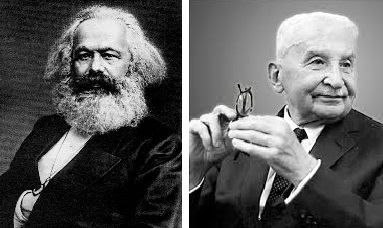
Geoffrey M. Hodgson
Property is a key concept. It is central to major ideological debates in politics and to much analysis in the social sciences.
Libertarians such as Nobel Laureate Milton Friedman, Nobel Laureate Friedrich Hayek and the leading Austrian economist Ludwig von Mises argued that the protection of private property is a vital condition for economic prosperity and individual liberty.
By contrast, socialists such as Robert Owen and Karl Marx called for the abolition of private property. They favoured the common ownership of the means of production, distribution and exchange.
But, despite their diametrically-opposed political views, key protagonists such as von Mises and Marx shared a similar, but deeply-flawed, understanding of the nature of property. Later economists have compounded this error, even in the so-called “economics of property rights”, as developed by Armen Alchian, Yoram Barzel and others.
This misunderstanding of the nature of property has major adverse consequences. Historical debates about the role of property rights in the development of capitalism have been impaired. Defective advice continues to be given to governments in developing countries, neglecting the way that property enmeshes with financial and state institutions.
Property as natural versus property as a historically-specific institution
Writers defending private property often argue that ownership is ubiquitous, not simply among early humans but also in other species. Animals compete, as either individuals or groups, over territory. Psychologists provide evidence of deeply rooted feelings concerning possession among human infants. So it is claimed that notions of property are enduring and hard-wired into the neuro-systems of humans and other animals.
 But feelings of possession are not the same thing as rights to property. The psychologist Lawrence Kohlberg pioneered the study of how individual humans develop an understanding of justice and morality from birth to adulthood.
But feelings of possession are not the same thing as rights to property. The psychologist Lawrence Kohlberg pioneered the study of how individual humans develop an understanding of justice and morality from birth to adulthood.
He and his colleagues demonstrated that it takes young humans a long time to distinguish between “I want X” or “X is mine”, on the one hand, and “I have a moral right to X”, on the other.
Similarly, the leading legal theorist Antony Honoré wrote in a classic article on ownership:

Antony Honoré
“To have worked out the notion of ‘having a right to’ as distinct from merely ‘having’ … was a major intellectual achievement. Without it society would have been impossible.”
Brute possession differs from moral or legitimate rights. But as Kohlberg lamented, some people grow up and never understand the difference.
If Marx or von Mises did grow up to learn the difference, then they made very little use of it in their writings.
Take von Mises first. He wanted to develop a theory of human action that would apply to the entire lifetime of our species. So, for example, von Mises’s concept of “exchange” is not limited to trade or contract over property, but applies to any form of human interaction, including the activities of Robinson Crusoe alone on his island.
Similarly, von Mises turned property into a concept that applies to all human history. When he considered property in his critical book on Socialism he put the brute fact of de facto control first:
“ownership is the having of the goods … This having may be called the natural or original ownership, as it is purely a physical relationship of man to the goods, independent of social relations between men or of a legal order.”
So does law have any place in our understanding of property? Von Mises continued:
“Economically … the natural having alone is relevant, and the economic significance of the legal should have lies only in the support it lends to the acquisition, the maintenance, and the regaining of the natural having.”
Hence, for von Mises, ownership was natural, asocial and ahistorical rather than legal or institutional. It was about “having” or possession. He downgraded the institutions required for the legitimation, protection and enforcement of the capacity to have, and neglected social aspects of ownership that may signal power or status.
Marx’s concept of property
Marx differed from von Mises, and not simply because he wanted to abolish private property. Marx also insisted that capitalist phenomena, including commodity exchange and markets, were historically specific and had not existed for all time.
But Marx’s concept of property was almost as broad as that of von Mises. Both concentrated on raw physical power over objects, rather than legal rights. Marx’s numerous discussions of “property” had little to say about legal rights, and he too conflated property with possession.

Karl Marx as a Young Man
Hence Marx in 1844 addressed “private property” and argued that “an object is only ours when we have it – … when we directly possess, eat, drink, wear, inhabit it, etc., – in short, when we use it.”
The distinction between property and possession was central to Pierre Joseph Proudhon’s famous 1840 book What is Property? Marx stridently criticized Proudhon’s work. But he paid little heed to its central distinction between possession and property.
With both Marx and von Mises, effective power over something, took priority over any legal or moral right. Legal and moral aspects of property were overshadowed.
While von Mises emphasized ownership by individuals, Marx defined social classes in terms of “property relations”, referring to what class controlled, and what class did not control, the means of production. Where von Mises stressed individuals, Marx stressed social classes. But for both of them it was a matter of control or possession.
Marx also claimed that tribal and hunter-gatherer societies owned “property” in common. This was “primitive communism”.

Thorstein Veblen
In response, the American institutional economist Thorstein Veblen argued convincingly in an 1898 essay that ownership and property were later institutional developments: “no concept of ownership, either communal or individual, applies in the primitive community. The idea of communal ownership is of a relatively later growth.”
This rightly implies that property means more than mere possession. Property requires historically specific institutions that did not exist in tribal societies. Property requires law and a state.
While the distinction between possession and property is ignored by Marxists and most modern economists, it is of supreme analytical and practical significance. It is impossible to understand capitalism in terms of mere possession, without an adequate conception of property.
Property: taking the law into account
Both Marx and von Mises put law on the surface of a more fundamental reality beneath: law was part of the “superstructure”, as Marx put it. More fundamental for both of them were brute powers of possession or control. For Marx, law simply “mirrored” those basic powers. For von Mises, law was relevant only insofar as it strengthened that physical control. For both of them, everything concerning property boiled down to control.
Different types of property right include the right to use a tangible or intangible asset (usus), the right to appropriate the returns from the asset (usus fructus), the right to change a good in substance or location (abusus), the right to the capital derived from the use of the good as collateral, the right to sell a good (alienation), and several other rights or limitations.
Note first that the legal right to control or use (usus) is only one of several legal types of right relating to property. By focusing on control, Marx and von Mises missed other important aspects of property.
Why is this important? Crucially for the functioning of capitalism, durable and alienable property can be used by its owner as collateral. Everyone who has a mortgage uses their property to obtain a loan. Entrepreneurs use their property to raise money to invest in their business.

Hernando de Soto
Consequently, as Hernando De Soto has argued, the registration of much property – particularly land and buildings – with recorded means to identify both property and owners, are crucial institutional mechanisms for economic development: they enable the use of such property as collateral for loans.
But this is not straightforward, precisely because property requires a satisfactory legal system and an effective state administration.
Another problem with the views of Marx and von Mises on property is their implicit understanding of human motivation. Both neglect our propensities to obey the law – as long as we regard it as legitimate – even if it does no otherwise align with our other goals.

Adam Smith
Consequently, as Adam Smith pointed out long ago, the administration and perception of justice is vital for a properly-functioning market economy. Without a perception of legitimacy in the legal arrangements, the institutional order of commercial life would break down. This theme is present in both his Theory of Moral Sentiments and his Wealth of Nations.
In modern, complex societies, law helps to constitute many social structures and to configure relations of power. Law is not simply super-structural or reflective. Along with others, I have described this approach as legal institutionalism. It builds on the works of earlier writers, including the American institutional economist John R. Commons.
Property rights and Chinese economic development
Arguments emphasising the perceived legitimacy of the legal system have implications for establishing the rule of (state) law, and particularly for installing just and secure property rights to help promote economic development.
China is an important test case for these arguments. China began its market reforms in 1978 and grew rapidly thereafter. But its systems of property, commercial and corporate law are still relatively underdeveloped compared to Europe or North America.
This fact, alongside its highly impressive economic growth since 1978, has led some prominent economists – including Nobel Laureate Joseph Stiglitz – to conclude that legally-enforced property rights are of lesser significance.
 But, despite superficial appearances to the contrary, there is evidence that legal systems and legal property rights matter. China’s explosive growth started when land-use (usus fructus) rights were widely conceded to the peasants after 1978. Local power from below tentatively established de facto powers, which spread widely and became de jure when they were legally ratified by the state.
But, despite superficial appearances to the contrary, there is evidence that legal systems and legal property rights matter. China’s explosive growth started when land-use (usus fructus) rights were widely conceded to the peasants after 1978. Local power from below tentatively established de facto powers, which spread widely and became de jure when they were legally ratified by the state.
But this does not mean that the legal ratification of land-use rights was unimportant. This endorsement, along with the institutional arrangements established from below, was vital to safeguard these rights. In addition, it was part of the development of a legal system which was necessary for any modern private enterprise economy.
Legalities matter, and evidence suggests that they matter still more as capitalism develops. There is strong evidence that economic growth is correlated with the rule of law, among other factors. As Francis Fukuyama put it: “The absence of the rule of law is indeed one of the principal reasons why poor countries can’t achieve high rates of growth.”
If China is to grow still further – into the ranks of middle-income countries – then it must pay attention to the reform and development of its legal system.
The exclusive focus on control overlooks the use of property as collateral for loans. The possibility of collateralization – which relies on legal and financial institutions – cannot be derived from possession alone. Further property rights involve institutions – relations between individuals as well as relations between individuals and things. They involve the state and law – not simply relations of control between social classes.
1688 and all that
These points are significant for an important ongoing debate on the causes of the rise of capitalism in Britain in the eighteenth century.

William of Orange 1688
In a famous 1989 paper, Nobel Laureate Douglass North and Barry Weingast argued that the key event was the Glorious Revolution of 1688, when William of Orange invaded and became king in the place of James II.
North and Weingast argued that the consequent settlement between king and parliament made property more secure and prompted the development of commerce, leading to the start of the Industrial Revolution in roughly about 1760.
The first major problem with this argument is that property rights in land in England were relatively secure from the thirteenth century. There was no major change in these circumstances in the years immediately following 1688. The foremost problem was not the security of this property but the feudal nature of property rights in land, which severely restricted its possible sale and use as collateral.

Douglass C. North
A second major problem is that over seventy years elapsed from 1688 to the beginning of the Industrial Revolution. If institutional changes relating to property after 1688 were so important, then why did they take so long to take effect? Economic growth in the 25 years after 1688 was no greater than in the preceding 25 years. Why was the take-off delayed for so long?
In my paper “1688 and all that” I offer a solution to this problem, based on a richer concept of property. The immediate effect of 1688 was to change England’s European alliances and to plunge the country into a series of wide-ranging wars, particularly against France and Spain.
The 1689 accord between King and Parliament made possible major changes in state administration and financial institutions, so that money could be raised to fund these wars. Guided by a more powerful Parliament, this new financial system stimulated reforms to landed property rights, the growth of collateralizable property and saleable debt, and thus enabled the Industrial Revolution.
Data on reforms of property rights show that key changes accelerated in the 1750s, making more land usable as collateral, which could be used to finance industrial ventures. Institutional changes immediately following 1688 were less to do with property: instead there is clear evidence of an immediate growth in state administration and increasing tax revenues to finance wars. This process included the formation of the Bank of England in 1694 and the growth of financial markets. Statutory legislation in 1704 helped the development of markets for debt.
Conclusion: a different perspective
This analysis suggests that the building of a state administration, which can sustain a modern monetary system and secure the use of private property as collateral, is an important precondition of rapid economic growth. Hence a stress on the “security of property rights” would be insufficient in developing countries. For more effective policies for economic development, the nature of property, and its connection with finance and politics, have to be better understood.
Neither Marx nor von Mises were particularly helpful in this regard.
Why did von Mises downplay the role of the state in his conception of property? He did so because he believed that markets and contractual exchange could function with little or no help from the state.
Why did Marx downplay the role of the state in his conception of property? He did so because he understood the state as the means by which one dominant social class exercises power over another. Marx, like von Mises, did not appreciate that under capitalism state law is necessary to constitute basic institutions such as property and contract.
Von Mises wanted a market economy with a minimal state. Marx thought that after the proletariat gained power and socialism was established, then the state would eventually “wither away”. Despite their other big differences, in theory and practice, they both thought that a large-scale complex economy could function with a minimal state. To understand property as a core institution of capitalism we need to transcend both of them.
With an improved understanding of the nature of property, we need to analyse data on its functioning in the developing world. In economic history we need more empirical studies of the role of lending, collateral and finance, in the growth of business and innovation.
Researchers should arise from slumbering in the Marx-Mises bed and set to work.
4 November 2016
Minor edits – 5-7 November, 7 December 2016
|
This book by G. M. Hodgson elaborates on some of the political issues raised in this blog:
Wrong Turnings: How the Left Got Lost
Published by University of Chicago Press in January 2018
|
Bibliography
Commons, John R. (1924) Legal Foundations of Capitalism (New York: Macmillan).
De Soto, Hernando (2000) The Mystery of Capital: Why Capitalism Triumphs in the West and Fails Everywhere Else (New York: Basic Books).
Deakin, Simon, Gindis, David, Hodgson, Geoffrey M., Huang, Kainan and Pistor, Katharina (forthcoming) ‘Legal Institutionalism: Capitalism and the Constitutive Role of Law’, Journal of Comparative Economics, print forthcoming, published online.
Fukuyama, Francis (2011) The Origins of Political Order: From Prehuman Times to the French Revolution (London and New York: Profile Books and Farrar, Straus and Giroux).
Heinsohn, Gunnar and Steiger, Otto (2013) Ownership Economics: On the Foundations of Interest, Money, Markets, Business Cycles and Economic Development (London and New York: Routledge).
Hodgson, Geoffrey M. (2015) Conceptualizing Capitalism: Institutions, Evolution, Future (Chicago: University of Chicago Press).
Hodgson, Geoffrey M. (2015) ‘Much of the “Economics of Property Rights” Devalues Property and Legal Rights’, Journal of Institutional Economics, 11(4), December, pp. 683-709.
Hodgson, Geoffrey M. (2017) ‘1688 and All That: Property Rights, the Glorious Revoution and the Rise of British Capitalism’, Journal of Institutional Economics, 13(1), March, print forthcoming, available free (open access) online.
Hodgson, Geoffrey M. (2017) Wrong Turnings: How the Left Got Lost (Chicago: University of Chicago Press).
Honoré, Antony M. (1961) ‘Ownership’, in Guest, Anthony G. (ed.) (1961) Oxford Essays in Jurisprudence (Oxford: Oxford University Press), pp. 107-47. Reprinted in the Journal of Institutional Economics, 9(2), June 2013, pp. 227-55.
Kohlberg, Lawrence (1969) ‘Stage and Sequence – the Cognitive-Developmental Approach to Socialization’, in D. A. Goslin (ed.) (1969) Handbook of Socialization Theory and Research (Chicago: Rand McNally).
Marx, Karl (1975) Early Writings (Harmondsworth: Penguin).
Mises, Ludwig von (1981) Socialism: An Economic and Sociological Analysis, translated from the second (1932) German edition of von Mises’s Die Gemeinwirtschaft (Indianapolis: Liberty Classics).
Mises, Ludwig von (1949) Human Action: A Treatise on Economics (London and New Haven: William Hodge and Yale University Press).
North, Douglass C. and Weingast, Barry R. (1989) ‘Constitutions and Commitment: The Evolution of Institutions Governing Public Choice in Seventeenth-Century England’, Journal of Economic History, 49(4), December, pp. 803-32.
Proudhon, Pierre Joseph. (1890) What is Property? An Inquiry into the Principle of Right and Government, translated from the French edition of 1840 (New York: Humbold).
Smith, Adam (1759) The Theory of Moral Sentiments; or, An Essay Towards an Analysis of the Principles by which Men Naturally Judge Concerning the Conduct and Character, First of their Neighbours, and Afterwards of Themselves (London and Edinburgh: Millar, and Kincaid and Bell).
Smith, Adam (1776) An Inquiry into the Nature and Causes of the Wealth of Nations, 2 vols, (London: Strahan and Cadell).
Stiglitz, Joseph E. (1994) Whither Socialism? (Cambridge, MA: MIT Press).
Tyler, Tom R. (1990) Why People Obey the Law (New Haven: Yale University Press).
Veblen, Thorstein B. (1898) ‘The Beginnings of Ownership’, American Journal of Sociology, 4(3), November, pp. 352-65.
Posted in Common ownership, Karl Marx, Liberalism, Ludwig von Mises, Markets, Private enterprise, Property Tagged with: Property
September 16th, 2016 by geoffhodgson1946
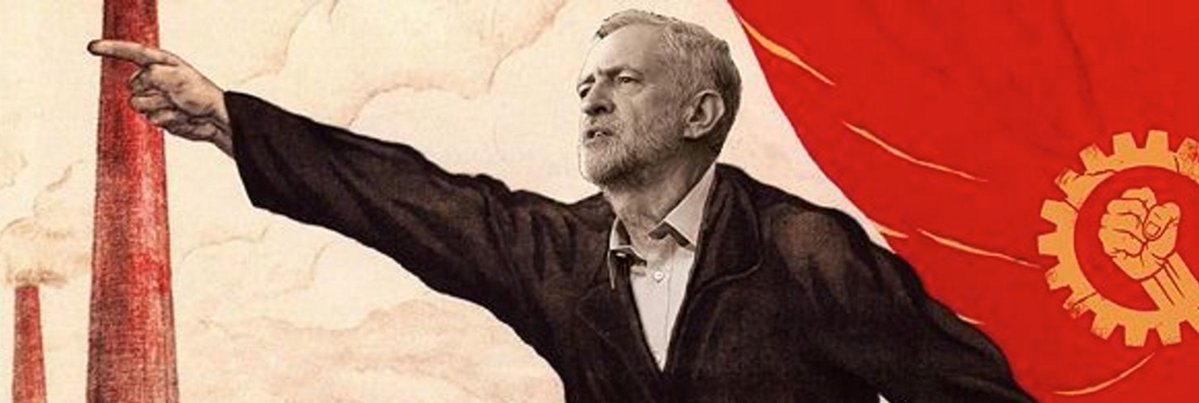
Geoffrey M. Hodgson
There are several different kinds of populism, emanating from both the left and right. But they have in common a view that some powerful minority group are clearly to blame for the ills suffered by a majority. As Julian Baggini put it, in his excellent article on Corbyn’s populism:
‘Populism is … a way of doing politics that has three key features. First, it has a disdain for elites and experts of all kinds, especially political ones. Second, it supposes that the purpose of politics is simply to put into action the will of the people, who are seen as homogenous and united in their goals. Third, it proposes straightforward, simple solutions to what are in fact complex problems.’
Rather than enter into a discussion over political problems and details, populists accuse those who fail to support them as collaborators of the exploiting elite. They believe that the elite is the main obstacle to progress, and solutions will appear once the elite is removed. They are suspicious of experts and dissenters. They are typically vague about their own objectives: their primary aim is to unite the bulk of the population behind a leader, against the elite.
The Great Crash of 2008 undermined confidence in existing elites. For this and other reasons, populism is now on the rise, in both Europe and the USA.
Populism on the Right
The campaign by UKIP to quit the European Union was populism incarnate. Its leader, Nigel Farage, complained frequently that the elites have gained too much power over hard-working ordinary people. Furthermore, elites at the national level had allegedly handed over power to unaccountable rulers in Europe, who have allowed mass immigration and robbed the UK of its sovereignty.
Because of his focus on a nationalist solution, and his identification of foreigners as a primary problem, Farage is an example of a right populist. By championing ‘ordinary British people’ against the establishment, and relying more on sentiment than on reasoned argument or expert advice, he is populist to the core.
 After his success in the Brexit referendum, Farage flew across the Atlantic to show his support for Donald Trump. At his August 2016 speech at a Donald Trump rally in Mississippi, Farage celebrated that Britain ‘chose not to be ruled by unelected old men in Brussels’. He drew parallels between the US and Britain, saying ordinary people everywhere had been ‘let down by government’. He was greeted by rapturous applause.
After his success in the Brexit referendum, Farage flew across the Atlantic to show his support for Donald Trump. At his August 2016 speech at a Donald Trump rally in Mississippi, Farage celebrated that Britain ‘chose not to be ruled by unelected old men in Brussels’. He drew parallels between the US and Britain, saying ordinary people everywhere had been ‘let down by government’. He was greeted by rapturous applause.
Trump’s rhetoric has much in common with that of Farage. Both blame immigrants for the problems in the country. Trump adds his rabid hostility to Muslims.
Corbynism as Left Populism
There are important differences between populists on the left and right. Left populists place less emphasis on the role of immigrants or foreigners: they are more inclusionary. Left populists also tend to favour greater state involvement in the economy. But elements of right populism can find their way into left movements, and vice versa.
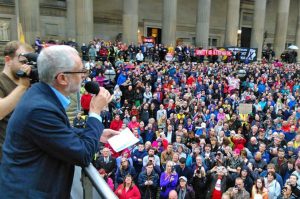 Jeremy Corbyn is very different from Nigel Farage and Donald Trump. Corbyn is neither a racist nor a misogynist (although he has shared political platforms with homophobes and anti-Semites). But Corbynism as a movement has strong populist features.
Jeremy Corbyn is very different from Nigel Farage and Donald Trump. Corbyn is neither a racist nor a misogynist (although he has shared political platforms with homophobes and anti-Semites). But Corbynism as a movement has strong populist features.
Other prominent examples of left populist movements include Syriza in Greece, Podemos in Spain and the ‘socialist’ regime established by the late President Hugo Chávez in Venezuela.
Labour has always been more pragmatic than ideological. Although Corbyn has some Marxist theoreticians close to him, including within his Momentum Praetorian Guard, he has relied much more on populist sentiment rather than Marxist theory.
The recent growth of left populism has been triggered by the crisis within social democracy, the disastrous invasion of Iraq in 2003, increasing economic inequality within leading economies, unaffordable housing, cuts in the welfare state and high rates of unemployment, especially among the young.
Corbynism vaguely promotes ‘socialism’, but there is no apparent agreement on what this means. There is a general suspicion of private enterprise, as well as a justified concern about the excessive power of some large corporations. When difficulties appear, public ownership is typically seen as the simple and obvious cure.
Like all populists, Corbyn rails against the elite. For him it is the rich minority and the large corporations. Like Farage, he identifies an elite that is bolstered by powerful friends abroad. But for Corbyn the most important foreign allies of the despised British elite are in Washington DC. With its anti-West foreign policy, Corbynism is Marxism-Leninism in populist clothing.
Corbynism Undermines Parliamentary Democracy
To public ownership is added the populist Corbynista slogans of ‘democratic control’ or ‘democratic management’ of enterprises. Without any detailed explanation of how this would work, it nevertheless reassures the left-populist followers that they, and not the elite, will somehow be in control. This left-populist slogan of ‘democratic control’ is seen as the obvious and straightforward way to ‘put into action the will of the people’.
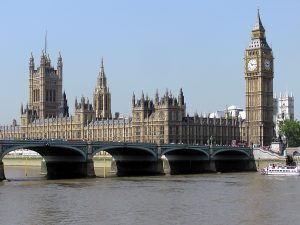
Some extension of worker and community participation is desirable. But it cannot be a substitute for managerial discretion and leadership. Corbyn’s ultra-democracy is infeasible. When it threatens parliamentary democracy it is dangerous.
The Corbynistas want to shift power away from Parliament. They want MPs to follow ‘the will of the people’, which means, in practice, the implementation in Parliament of the resolutions of their local constituency parties. Inadequate heed is taken of the diverse views and interests of the electorate, and the need for expert deliberation and debate to make policy feasible and effective.
Instead of careful, empirically-grounded debate among diverse viewpoints, aimed at developing viable policies to deal with complex economic and political problems, Corbynistas are suspicious of dissent from their official line.
Any defence of markets or private ownership is worrying for them. It challenges their ‘obvious’, ‘democratic’ and simplistic solutions, and therefore must be opposed. Such dissent is branded ‘Blairite’ or ‘red Tory’ or ‘neoliberal’.
Instead of pluralism and extended debate, Corbynism treats the party resolution as the correct line, which all are instructed to follow. There is little appreciation of the complexity of modern politico-economic systems, and the consequent fallibility of all decision making.
Parliamentary institutions have evolved to deal with real-world complexities. They provide some mechanisms to challenge and scrutinise legislation. By moving from representative to delegate democracy, Corbynism would corrode the basic institutions of parliamentary democracy.
Any leader of any political party committed to working through parliament would resign when 80 per cent of his or her parliamentary representatives passed a vote of no confidence in his or her leadership. When this happened, Corbyn did not resign: his primary focus is not on parliament but on the populist ‘mass movement’ outside.
Totalitarian Dangers of Populism – The Example of Venezuela
The record of both left and right populism in power is abysmal. There is an important example of left populism in power, and it is close to Corbyn’s heart.
He has always had a romantic soft spot for Latin American revolutionaries. He wrote in 2011: ‘What the Cubans and … Che Guevara were preaching in the 1960s has an even greater resonance today’. This suggests that armed insurrection is appropriate, even in those Latin American countries that have become democracies.

Jeremy Corbyn and Hugo Chávez
In 1998, the Marxist politician Hugo Chávez was elected as President of Venezuela. Using the high oil revenues during 1999-2007, his government expanded access to food, housing, healthcare, and education, especially for the poor and the indigenous minorities.
Chávez nationalized key industries and created participatory Communal Councils. His ‘Chavista’ populism emphasised the ‘will of the people’, against the rich elite and their perceived allies in the United States.
Chávez created new ‘democratic’ institutions at the base to bolster his power. In 1999, the new Constitutional Assembly, filled with elected supporters of Chávez, drafted a new constitution that made censorship easier and granted the executive branch of government more power. The Constitutional Assembly extended the presidential term. It abolished the two houses of Congress. It also granted Chávez the power to legislate on citizen rights, to promote military officers and to oversee economic and financial matters.
In 2002 Chávez was briefly deposed in a coup, which may have had support from foreign agencies such as the CIA. The hostility of the US government to his regime was no secret. But Chávez was restored to power by the army and popular mobilisations.
Chávez seized control of the courts and the electoral authority, and suppressed much of the opposition media. He removed political checks and balances, seeing them as obstacles to his socialist revolution.

Hugo Chávez
Accordingly, the device of populist democracy was used to push the country in the direction of dictatorship. The high pre-Crash oil revenues were used to address some basic needs and to buy the support of the people. These supporters were then persuaded to approve increases in presidential powers, to protect the ‘socialist revolution’ against its enemies.
Chávez failed to diversify the economy and reduce its reliance on oil. He antagonised private investors. The economy was not robust enough to withstand the post-2008 oil price collapse. His government had become one of the most corrupt in the world. Serious shortages of food and medicine emerged. Chávez died of cancer in 2013 and was replaced as President by Nicolás Maduro.
But Corbyn’s enthusiasm for the regime was undiminished. As late as 2015, when Venezuela was in ever-deepening crisis, he remarked:
‘we celebrate, and it is a cause for celebration, the achievements of Venezuela, in jobs, in housing, in health, in education, but above all its role in the whole world … we recognise what they have achieved.’

Food Shortages in Venezuela
These gave him powers to intervene more heavily in companies and in the currency markets. Arbitrary detentions of dissidents became more common.
In July 2016 he used his executive powers to decree that citizens could be forced to work in the country’s fields for 60-day periods, which may be extended ‘if circumstances merit.’
Starvation became rife. In August 2016 a gang of hungry Venezuelans broke into a zoo and butchered a horse for its meat.
Populism in general, and the left populisms of Chávez, Maduro and Corbyn in particular, are profound threats to any enduring and viable democracy. Using Chávez as a prime example. Kurt Weyland wrote:
‘Determined and politically compelled to boost their personal predominance, populist leaders strive to weaken constitutional checks and balances and to subordinate independent agencies to their will. They undermine institutional protections against the abuse of power and seek political hegemony. Correspondingly, populist leaders treat opponents not as adversaries in a fair and equal competition, but as profound threats. Branding rivals “enemies of the people,” they seek all means to defeat and marginalize them. Turning politics into a struggle of “us against them,” populists undermine pluralism and bend or trample institutional safeguards.’

“There’s no food”
The tragic example of Venezuela is a warning to us all. Like Corbyn, Chávez started with a fairly modest economic programme, closer to social democracy than Marxist orthodoxy. But to bolster his power, Chávez extended state control. Maduro further undermined freedom of speech and put opponents in jail.
Because of a populist mistrust of liberal, pluralist institutions, Venezuela is lurching toward despotism. Currently it retains some semblance of democracy, but press freedom is limited and critical journalists are jailed. Since 2004, ‘defamation’ of the government, including ‘disrespect for the authorities’, has been a criminal offence.
Supporters of Chávez and Maduro blame the hostility of the US for Venezuela’s distress, just as it was blamed for economic problems in Cuba after its 1959 revolution. US belligerence made things worse. But the major cause of economic stagnation in both places is the hobbling of the private sector, and the unchecked concentration of excessive political, legal and economic power in the hands of the overbearing state.
Populism must be Defeated
Although it is unlikely that either UKIP or Corbyn’s Labour will ever win power, they can do serious damage to public debate and the functioning of a parliamentary democracy. In particular, by neutering Labour as a parliamentary force, the UK is deprived of an effective opposition to the Tory government.
 Consider the example of the EU referendum in June 2016. After the result, Corbyn took it for granted that Britain should leave the EU and immediately trigger Brexit, irrespective of the outcome of Britain’s negotiations on the terms of leaving. Like his fellow-populist Farage, Corbyn accepted that ‘the people had spoken’. For him, the expression of popular will was the end of the matter.
Consider the example of the EU referendum in June 2016. After the result, Corbyn took it for granted that Britain should leave the EU and immediately trigger Brexit, irrespective of the outcome of Britain’s negotiations on the terms of leaving. Like his fellow-populist Farage, Corbyn accepted that ‘the people had spoken’. For him, the expression of popular will was the end of the matter.
After the June 2016 vote to leave the EU, Britain is probably in its worse political crisis since the Second World War. It faces years of political and economic uncertainty, with no obvious resolution. In these circumstances, popular frustration and deprivation can feed populism. Left populism has its own dangers, and we know from history that left populists can shift to the right. In turn, right populism can feed fascism.
All populisms, including Corbynism, pose a serious threat to representative democracy. As Baggini put it:
‘Our tradition of representative democracy rests on a rejection of all three pillars of populism. It accepts that a well-run society needs specialists and full-time politicians whose judgments often carry more weight than those of voters who put them into power. It accepts that the “will of the people” is diverse and contradictory, and that the job of politics is to balance competing demands, not simply to obey them. It follows that there are few, if any, easy solutions and that anyone who promises them is a charlatan. Making the case for representative democracy therefore means telling the electorate it doesn’t always know best, a truism that populism has turned into an elitist heresy.’
Populists do not understand that political checks and balances, safeguarded by countervailing politico-economic power, are necessary to help protect democracy and liberty. With confidence in their ‘obvious’ solutions to complex problems, they treat criticism with disdain and close down reasonable discussion. All must ‘unite behind the leader’ who is revered for saving the masses from the enemy elite.
For these reasons Corbynism must be treated as a dangerous ideological threat to a liberal democracy, and not as an infantile, reversible outburst of ultra-leftism.
No-one has a feasible strategy to turn Labour back to its previous form. History offers no clear example of the internal undoing of populist fanaticism. It has always been defeated from outside. Labour is now irretrievable: there is no way of reversing the populist entrenchment within.
Corbyn’s Labour is a danger for the British political system as the Tories are for its economy and for its social fabric. Corbynism is a threat to liberal, pluralist democracy.
We need to build a progressive opposition to both Toryism and Corbynism. We need to defend liberal, pluralist democracy from the populisms of left and right. Building an alternative will take a generation, but we must start now.
16 September 2016
Minor edits: 17,18, 22 September 2016
Major edit: 18 June 2017

Bibliography
Bagehot (2016) ‘Why a “True Labour” splinter party could succeed where the SDP failed’, The Economist, 12 April. http://www.economist.com/blogs/bagehot/2016/08/labour-pains.
Baggini, Julian (2016) ‘Jeremy Corbyn is a great populist. But that’s no good for our democracy’, The Guardian, 30 July. https://www.theguardian.com/commentisfree/2016/jul/25/jeremy-corbyn-populist-democracy-mps.
Borger, Julian (2016) ‘Venezuela’s worsening economic crisis’, The Guardian, 22 June. https://www.theguardian.com/world/2016/jun/22/venezuela-economic-crisis-guardian-briefing
Canning, Paul (2016) ‘Venezuela: The Left’s giant forgetting’. http://paulocanning.blogspot.co.uk/2016/09/venezuela-lefts-giant-forgetting.html
Corbyn, Jeremy (2011) ‘Foreword, to John A. Hobson, Imperialism: A Study’, facsimile reprint of 1902 edition (Nottingham: Spokesman).
Cunliffe, Rachel (2016) ‘Corbyn looks the other way as Venezuela self-destructs’, 18 January, http://capx.co/corbyn-looks-the-other-way-as-venezuela-self-destructs/.
Lawson, Neal (2016) ‘Social democracy without social democrats: how can the left recover?’ New Statesman. 12 May. http://www.newstatesman.com/politics/staggers/2016/05/social-democracy-without-social-democrats-how-can-left-recover.
Telesur (2015) ‘British MP Jeremy Corbyn speaks out for Venezuela’, 6 June. http://www.telesurtv.net/english/news/British-MP-Jeremy-Corbyn-Speaks-Out-For-Venezuela-20150605-0033.html.
Weyland, Kurt (2013) ‘The threat from the populist left’, Journal of Democracy, 24(3), pp. 18-32.
Wikipedia (2016) ‘Populism’. https://en.wikipedia.org/wiki/Populism.
Posted in Democracy, Jeremy Corbyn, Labour Party, Left politics, Liberalism, Populism, Socialism, Uncategorized, Venezuela
August 16th, 2016 by geoffhodgson1946
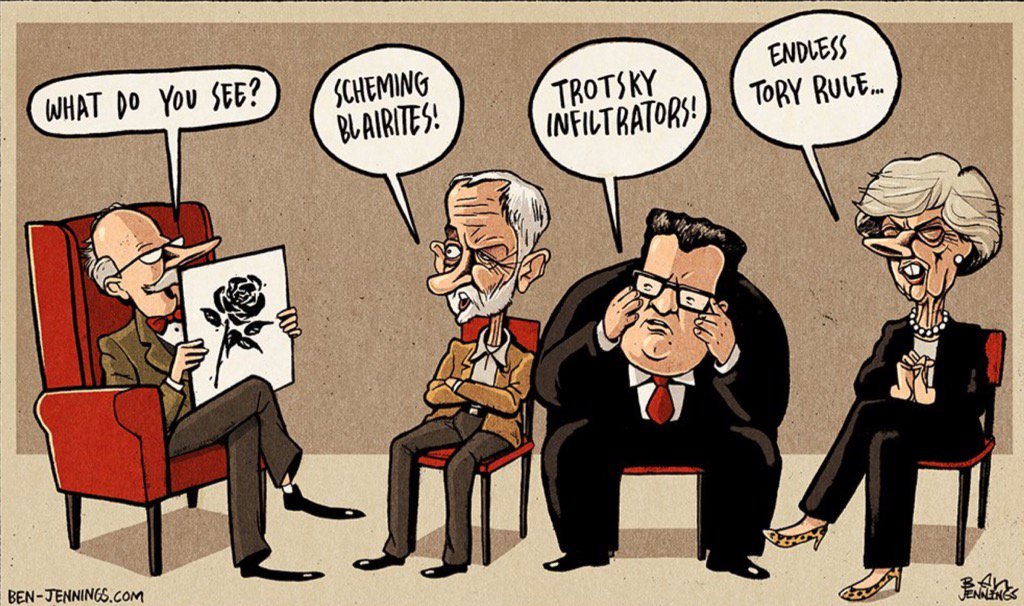
Geoffrey M. Hodgson
“This, from the always measured g. m. hodgson, shows Labour’s existential crisis in horrifying detail” – Susan Wilde
“The revolutionary road: excellent sober distillation of Marxism/Leninism/Trotskyism/socialism; rights v insurrection” – Rich Greenhill
“A very good summary of Labour and Trotskyism” – Gerry Hassan
“Another fantastic article!” – Lily Jayne Summers
John McDonnell, the Labour Shadow Chancellor, is an admirer of Trotsky. Corbyn once called upon the USSR to rehabilitate the Russian revolutionary.2
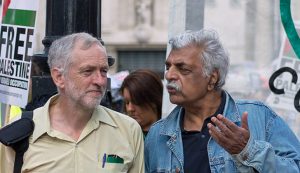 Trotskyists are socialists who believe in the common ownership of the means of production. This goal was stated in Labour’s Clause Four from 1918 to 1995, so why shouldn’t Trotskyists be allowed to join Labour?
Trotskyists are socialists who believe in the common ownership of the means of production. This goal was stated in Labour’s Clause Four from 1918 to 1995, so why shouldn’t Trotskyists be allowed to join Labour?
Trotskyists differ from the devotees of Mao Zedong or Joseph Stalin. Trotskyists do not describe the murderous regimes of Mao’s China and the USSR as socialist. They promote themselves as anti-totalitarian, and they might seem much more democratic than other Marxists.
So why shouldn’t Trotskyists be allowed to join Labour?
The Parliamentary versus the Revolutionary Road
There is a prominent negative answer to this question. It raises profound differences of strategy. As Neil Kinnock (who did the party a great service by kicking out Militant in 1985) said in a speech to the Parliamentary Labour Party in July 2016:
‘In 1918 in the shadow of the Russian revolution [Labour members decided] … that they would not pursue the revolutionary road – it was a real choice in those days. They would pursue the parliamentary road to socialism.’
According to this view, Labour members and revolutionary Marxists share the same aim – socialism – but they differ on the method of getting there. Labour follows the parliamentary road; Marxists choose the revolutionary road.

Robert Owen
There are big problems with a part of this argument. Socialism was defined by Robert Owen and Karl Marx in terms of common ownership of the means of production and ‘the abolition of private property’.
But at least in practice since 1945, Labour has been less and less devoted to this goal. Finally, the goal of ‘common ownership’ was removed from Clause Four of the Labour Party Constitution in 1995.
Labour now says that it is a ‘democratic socialist’ party but defines this not in terms of common ownership. Instead there is a goal of social solidarity, believing ‘that by the strength of our common endeavour we achieve more than we achieve alone’, and in a society ‘in which power, wealth and opportunity are in the hands of the many not the few’.
Arguably, such a goal might be achievable in a reformed capitalism. But Trotskyists, like all Marxists, are emphatically against capitalism.
What Trotskyists and the post-1995 Labour Party Constitution mean by ‘socialism’ are very different. The divergences between Labour and Trotskyists concern different ends, as well as different means.
But Corbyn’s election as Leader by over 59 per cent of the membership in 2015 shows that the traditional definition and goal of socialism in the Labour Party is far from dead and buried. Under Corbyn’s leadership, Labour could return to its pre-1995 goals.

Tony Blair
Ironically, by getting rid of the traditional ‘common ownership’ version of socialism in 1995, but retaining the word ‘socialism’ in an attempt to invest it with a different meaning, Tony Blair provided legitimacy for any later attempt by classical socialists – including currently by Trotskyists and Corbynistas – to restore Labour to its original colours.
Within Labour today, because of this legacy, everyone from Trotskyists and Corbynistas at one extreme, through Owen Smith, Neil Kinnock and then on to Tony Blair at the other extreme, is obliged to call themselves a ‘socialist’. But there are massive silences and huge disagreements on its meaning.
Labour becomes less capable of discussing fundamental differences of goal, but clings onto the illusion of the fundamental goodness of something called ‘socialism’. Labour’s problem of entryism will never go away while the s-word continues to cast its spell. The word itself is an invitation for those who propose the common ownership of anything to join.
The Totalitarian Politics of Class Struggle
There are other fundamental problems with Marxism in general, and Trotskyism in particular. First, Marxism rejects the supreme values of the Enlightenment.
For example, Frederick Engels in Socialism: Utopian and Scientific, saw these Enlightenment values as ‘nothing more than the idealized kingdom of the bourgeoisie’ with its ‘bourgeois justice’, its ‘bourgeois equality before the law’ and ‘bourgeois property … proclaimed as one of the essential rights of man’.
 Marxists do not see the French Revolutionary principles of liberty, equality and fraternity as a potential achievement for all, but the rhetoric of the rising capitalist class in the class struggle against the old feudal order.
Marxists do not see the French Revolutionary principles of liberty, equality and fraternity as a potential achievement for all, but the rhetoric of the rising capitalist class in the class struggle against the old feudal order.
After playing their progressive historic role, Enlightenment ideas are seen as ‘bourgeois’ ideology, which now serves to repress the working class.
Marx saw socialism as the class destiny of the proletariat, which by overthrowing capitalism would emancipate humankind from inequality and exploitation. Socialism was not validated by an appeal to justice or rights. Instead it was grounded on ‘material’ and ‘economic’ developments within capitalism that were leading to growing internal crises and the rise of the proletariat.
Marx rejected all appeals to rights or justice. He bypassed the issues of morality and justice by focusing on the real social forces allegedly leading to socialism. But neither the driving forces of history nor the supposed destiny of a social class make this socialist future just, or morally right.

Karl Marx
By shelving the discourse on rights, in favour of the scientifically-clothed rhetoric of proletarian destiny, all versions of Marxism – including Trotskyism – are on the slippery slope toward totalitarianism.
When rights are no longer universal, and no-one has the protection of an independent legal system, the any action that is deemed ‘counter-revolutionary’ or ‘against the interests of the working class’ gives the accused no effective defence. The prosecutors monopolise the interpretation of guilt. Arbitrary punishment can follow.
The rights of critics and dissenters have to be protected, by their formal recognition and the autonomy of the judiciary. Unless this is done, any criticism can be crushed.
Trotsky was wrong: the roots of totalitarianism do not lie principally in the personalities of brutal, power-hungry individuals such as Stalin, but in Marxism itself. As Leszek Kolakowski suggested:
‘Marx’s anticipation of perfect unity of mankind and his mythology of the historically privileged proletarian consciousness … were responsible for his theory being eventually turned into an ideology of the totalitarian movement: not because he conceived of it in such terms, but because its basic values could hardly be materialized otherwise.’
Violence versus Parliament and Law
Laws get in the way of revolutionary struggle. Hence, along with their dilution of the notion of rights, Lenin proposed that all laws should be abolished.
 Writing in 1918, Lenin described the desired ‘dictatorship of the proletariat’ as ‘rule based directly upon force and unrestricted by any laws. The revolutionary dictatorship of the proletariat is rule won and maintained by the use of violence by the proletariat against the bourgeoisie, rule that is unrestricted by any laws.’ Trotsky supported Lenin in this and most other respects.
Writing in 1918, Lenin described the desired ‘dictatorship of the proletariat’ as ‘rule based directly upon force and unrestricted by any laws. The revolutionary dictatorship of the proletariat is rule won and maintained by the use of violence by the proletariat against the bourgeoisie, rule that is unrestricted by any laws.’ Trotsky supported Lenin in this and most other respects.
Consequently, a fundamental problem with Marxism is its failure to support the universality of human rights. Human rights apply to all, as in the majestic 1948 United Nations Declaration of Universal Human Rights.
Instead, Marxists see social advancement as a matter of ‘class struggle’ where one class must seize power and remove rights from another class. Lenin and Trotsky went one step further: they argued that this struggle for proletarian power must override the rule of law.
The Second Congress of the Communist International took place in Russia in 1920. Under the leadership of Lenin, one of its resolutions mentioned ‘bourgeois parliaments’ and declared:
‘The task of the proletariat consists in breaking up the bourgeois state machine, destroying it, and with it the parliamentary institutions, be they republican or constitutional monarchy.’
 Throughout his life, Trotsky defended the decisions of the first four congresses of the Communist International, which took place when Lenin was alive and before Stalin seized power.
Throughout his life, Trotsky defended the decisions of the first four congresses of the Communist International, which took place when Lenin was alive and before Stalin seized power.
Trotsky added his own idea of ‘permanent revolution’, involving civil war, even in a parliamentary democracy:
‘Socialist construction is conceivable only on the foundation of the class struggle, on a national and international scale. This struggle … must inevitably lead to explosions, that is, internally to civil wars and externally to revolutionary wars. Therein lies the permanent character of the socialist revolution as such, regardless of whether it is a backward country … or an old capitalist country which already has behind it a long epoch of democracy and parliamentarism.’
Conclusion: Hands Tied Behind their Backs
Those in Labour wanting to fight the battle against entryism have two hands tied behind their backs.
 First, by hanging on to the word ‘socialism’, after abandoning its original meaning, it is difficult to exclude those who are more genuinely socialist in the classical sense of common ownership. Labour’s obligatory (but now shallow) rhetoric of ‘socialism’ is a green light for socialist entryists of all kinds.
First, by hanging on to the word ‘socialism’, after abandoning its original meaning, it is difficult to exclude those who are more genuinely socialist in the classical sense of common ownership. Labour’s obligatory (but now shallow) rhetoric of ‘socialism’ is a green light for socialist entryists of all kinds.
Second, Labour has long-ago ditched the politics of class struggle, but it retains a notion of class partisanship in its very name. It was formed historically to represent the interests of the working class. It was built upon the trade union movement. Labour itself is a class party.
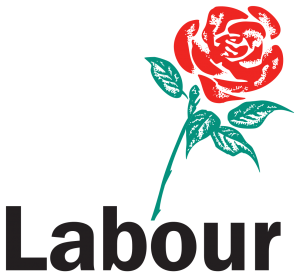 Of course, Labour in practice has put aside the notion that it is speaking for one section of society only. But its name remains a problem, both for broadening its appeal and for barring the more energetic and extreme exponents of working class representation and power.
Of course, Labour in practice has put aside the notion that it is speaking for one section of society only. But its name remains a problem, both for broadening its appeal and for barring the more energetic and extreme exponents of working class representation and power.
Of course, to achieve its goals, Labour is pledged to working through parliament, rather than through revolution. This is a very important difference. Many Marxists are still devoted to insurrection. Labour clearly is not. With this one big foot it can kick back. But its two hands are tied.
Labour still has much outdated baggage to deal with. Even if it staves off Trotskyist entryism – which now seems unlikely, at least while Corbyn is Labour Leader – it still will have a number of big problems. It will need to find and package a new identity for itself, which is suitable for the twenty-first century.
Retaining an unconvincing redefinition of ‘socialism’ and calling itself ‘Labour’ will not do.
Labour needs to come to terms with the fact that both classical socialism and class politics are untenable. It has to put democratic and progressive Enlightenment values at its centre, and reconfigure itself for the challenges of the twenty-first century.
16 August 2016
Minor edits: 17-18 August 2016
Endnotes
- Note that I refrain in this article from estimating the scale or impact of Trotskyist entryism in the Labour Party. They are not central to my argument here. For evidence of both (and of Corbyn’s links with the IRA) see here. At least currently, entryists into Labour are probably few in number, but it is a well-established fact that a few determined people can influence many thousands.
- In 2010, McDonnell attended an event commemorating the 70th anniversary of Trotsky’s assassination and has praised the ‘importance’ of his ideas (Riley-Smith 2016a). In 1988 Corbyn demanded from Parliament that the USSR should ‘give complete rehabilitation to Leon Trotsky’ (Riley-Smith, 2016b). Nothing wrong with that, but its shows the way he leans and who he chooses as friends.
- Personal note: I was a critical and wobbly Trotskyist from 1968 to 1973. I re-joined the Labour Party in 1974 and left it in 2001. The photograph below shows me (not then a Trot) visiting Trotsky’s house in Mexico in 1981, where he was murdered in 1940. It is a moving and impressive place.

References
Crick, Michael (2016) Militant (London: Biteback Publishing), esp. pp. xvii–xviii.
Kolakowski, Leszek (1977) ‘Marxist Roots of Stalinism’, in Robert C. Tucker (ed.) (1977) Stalinism: Essays in Historical Interpretation (New York: Norton), pp. 283-98.
Lenin, Vladimir Ilyich (1967) Selected Works in Three Volumes (London: Lawrence and Wishart), esp. vol. 3, p. 49.
Marx, Karl and Engels, Frederick (1962) Selected Works in Two Volumes (London: Lawrence and Wishart), esp. vol. 2, p. 117.
New Park Publications (1977) The Second Congress of the Communist International, 2 vols (London: New Park), esp. vol. 2, p. 52.
Riley-Smith, Ben (2016a) ‘Labour Entryism Row: John McDonnell Attended Celebration of Leon Trotsky and Praised ‘Importance’ of his Ideas’, The Telegraph, 14 August. http://www.telegraph.co.uk/news/2016/08/14/labour-entryism-row-john-mcdonnell-attended-celebration-of-leon/.
Riley-Smith, Ben (2016b) ‘Jeremy Corbyn Called for a “Complete Rehabilitation” of Leon Trotsky in Parliament’, The Telegraph, 16 August. http://www.telegraph.co.uk/news/2016/08/15/jeremy-corbyn-called-for-complete-rehabilitation-of-leon-trotsky/
Sparrow, Andrew and Jones, Harrison (2016) ‘Secret Recording of Kinnock’s anti-Corbyn Speech to MPs – In Full’, The Guardian, 6 July. http://www.theguardian.com/politics/2016/jul/08/secret-recording-neil-kinnock-jeremy-corbyn-step-down-speech-to-mps-in-full.
Trotsky, Leon D. (1962) The Permanent Revolution and Results and Prospects (London: New Park), esp. ch. 10.
Watson, Tom (2016) ‘Tom Watson Sends Corbyn “Proof of Trotskyist Labour Infiltration”’, The Guardian, 10 August. http://www.theguardian.com/politics/2016/aug/10/tom-watson-sends-corbyn-proof-of-trotskyist-labour-infiltration
Posted in Common ownership, Democracy, Jeremy Corbyn, Labour Party, Left politics, Liberalism, Nationalization, Robert Owen, Socialism, Tony Benn, Tony Blair, Uncategorized
August 10th, 2016 by geoffhodgson1946

Geoffrey M. Hodgson
‘This is a thundering good read’ – Peter Smith
‘The best article I’ve read for a while’ – Karen Bradley
‘Brilliant on why socialism isn’t “obvious”’ – Robbie Hudson
‘Very informative & sobering. Highly recommended’ – Jan Davies
One thing in British politics is very obvious: Jeremy Corbyn and his followers are very keen on something they call socialism. But this word has migrated in meaning since it first appeared in English in 1827. So it is reasonable to ask what they mean by it.
I’ve tried. I got lots of vague answers.
I fully appreciate that the Mirror is an unsuitable forum for a detailed account of the workings of the future socialist utopia, but unfortunately I have little else to go on. Apart from some gestures in favour of nationalization, and some sentimentality for the pre-Blair version of Labour’s Clause Four, I can find no fuller account of what Corbyn’s ‘socialism’ means.
Yet we are told twice (in one short quote) that it is ‘obvious’.
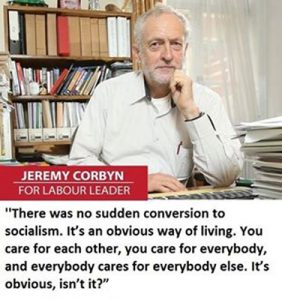 Here is my own confession: fifty years ago I believed that socialism was ‘obvious’. Eventually I was persuaded otherwise. Initially, it was not my growing awareness of the horrendous consequences of the socialist experiments in Russia, China and elsewhere that jolted me.
Here is my own confession: fifty years ago I believed that socialism was ‘obvious’. Eventually I was persuaded otherwise. Initially, it was not my growing awareness of the horrendous consequences of the socialist experiments in Russia, China and elsewhere that jolted me.
My comrades and I saw these deformations as unfortunate results of Stalinist bureaucracy plus Western hostility. We believed that a different, ‘democratic socialism’, was possible.
What persuaded me that socialism is not ‘obvious’ was a consideration of how such a system could work, in detail and in practice. How would production and distribution be organised? How would dispersed information concerning production and distribution be gathered and processed? How would resources be allocated? Who would decide? How would trillions of dispersed decisions be somehow processed by democratic committees? How would less-devoted workers be incentivized or persuaded to work harder or with greater attention to detail? What incentives would exist to encourage innovation and change, especially when everything had to be referred to some democratic council? And so on.
Once you begin to ask these difficult questions, socialism becomes much less ‘obvious’.
Numbers and incentives
Some version of socialism might work on a small scale. Cooperation can work in small groups, based on close, inter-personal interactions. Humans have co-operated in this way, in families and tribal units, for many thousands of years.
 Nobel Laureate Elinor Ostrom studied the management of common-pool resources – such as medieval common land, fisheries or agricultural irrigation schemes – and showed how they can be effectively managed by relatively small local communities.
Nobel Laureate Elinor Ostrom studied the management of common-pool resources – such as medieval common land, fisheries or agricultural irrigation schemes – and showed how they can be effectively managed by relatively small local communities.
Their small size allows participants to monitor each other, to ensure that necessary tasks are carried out and that the interests of the community are served.
Enforcement mechanisms range from praise to punishment. Within these relatively small and cohesive groups, trust and targeted sanctions are mechanisms for encouraging cooperation, reciprocity and compliance with social rules.
But these mechanisms depend on a degree of familiarity with one another. Big problems emerge when we move from tribal to large-scale societies. These began to develop about twelve thousand years ago. Our natural and cultural dispositions to cooperate and to help one another had to be supplemented by other mechanisms.
In larger societies, face-to-face, trust-based mechanisms to sustain cooperation are relatively less effective. When we move from communities of a hundred or so, where it is possible for everyone to know everyone else, to communities of thousands or more, then interpersonal trust and reputation are much less successful with large-scale interactions, and they have to be supplement by other incentives and constraints.

The increase of scale can create incentive problems that can be overcome in smaller communities. Many socialist experiments involved collectivisation. But when thousands of people are brought together, and rewards are shared, then there is less incentive to make the extra effort, because the rewards from that additional work would be hugely diluted.
This problem was illustrated dramatically in China. After the Communist Revolution of 1949, agriculture was organized into large collective farms. Farmers had little incentive to improve productivity, other than by threats and bureaucratic bullying. Risky innovation was unwise. Productivity remained low and often there were shortages of food.
Mao Zedong died in 1976, opening up the possibility of reform. In 1978 some peasant farmers decided to withdraw from collective farms and take responsibility for production at the household level, where the household (instead of the collective) received the revenue from its sold output. Individual households had much greater incentives to work harder and to innovate.
After decades of slow growth under Mao, China’s explosive economic growth began with those changes in rural areas. As a result, unprecedented millions were lifted out of poverty. China’s spectacular economic growth began when agriculture began to pass into the private control of the peasants after 1978.
|
This book by G. M. Hodgson elaborates on some of the political issues raised in this blog:
Wrong Turnings: How the Left Got Lost
Published by University of Chicago Press in January 2018
|
While interpersonal interactions can engender cooperation on a small scale, and they continue to do so in families and small communities, in large-scale societies other mechanisms and incentives are necessary. Economic history teaches us that modern dynamic economies depend on markets, competition and a large private sector, as well as an effective state.
 Corbyn is right: it is very important that we care for one another. But in terms of practical input, we cannot care equally for everyone. We can care more readily for those close to us, who we know well: our family, our friends and our workmates. But extending our caring to society as a whole becomes more of a political and less of a personal project. We need caring governments, but the practical extension of caring from the personal to the political is neither obvious nor easy.
Corbyn is right: it is very important that we care for one another. But in terms of practical input, we cannot care equally for everyone. We can care more readily for those close to us, who we know well: our family, our friends and our workmates. But extending our caring to society as a whole becomes more of a political and less of a personal project. We need caring governments, but the practical extension of caring from the personal to the political is neither obvious nor easy.
The need for countervailing power
A simplistic response would be to suggest that we elect a government that is staffed by well-meaning individuals. But to different degrees, almost everyone is corruptible. Even the uncorrupt have their own biased agendas and priorities.
 There is a need for rules, monitoring and countervailing power. If all economic power is concentrated in the bureaucracy of planners, then will be no effective alternative power that can countervail.
There is a need for rules, monitoring and countervailing power. If all economic power is concentrated in the bureaucracy of planners, then will be no effective alternative power that can countervail.
Even if politicians are competent and well meaning – lots of them are – they still face the problems of dispersed knowledge and uncertainty in modern, large-scale, and highly complex economies.
Consequently, relatively little can be planned from the top. Solutions to real-world, nitty-gritty problems are rarely ‘obvious’. There is a need for both humility and experimentation. We need to try and see what works and learn from mistakes, rather that rushing headlong towards what seems obvious.
The survival of democracy depends on a dispersion of real economic and political power. A healthy, pluralist polity depends on a pluralist economy, with multiple centres of autonomous decision-making. This means a system of private enterprise, as well as a political system with checks, balances and power that can be held to account. The state can and must also play a vital role in the economy, but not to the extent that it smothers private enterprise and initiative.
There is a large and fascinating analytical literature on the problems involved in classical socialism, and I cite a few works on this below. There is not the space to go into it further here. These works are not all written by neoliberals. But intelligent neoliberals – despite their limitations – are often worth reading. Although there are disagreements on approach and detail, the general conclusion is that large-scale socialism cannot work effectively and democratically. This analytical conclusion is corroborated by the historical experience of stagnation in innovation in Soviet-style regimes.1
The ‘obvious’ roots of fanaticism and intolerance
The ‘obviousness’ of socialism empowers its supporters with enduring energy and even fanaticism. If socialism is ‘obvious’, how do we explain the failure of other intelligent people to get on board? If they are not stupid, then they must be acting out of personal malice or greed. They must have sold out their principles in some way. Or they are just plain nasty. When socialism is seen as ‘obvious’, its opponents are regarded as stupid or evil.
The perceived ‘obviousness’ of socialism fuels both fanaticism and intolerance. Because the solution to the problem is ‘obvious’, there can be no doubt. There is no need to experiment, to seek wise counsel, or to listen to critics. Those that deny the obvious are deluded, corrupted, or in the pay of those that gain from the existing system.
 The great American politician Robert F. Kennedy once said:
The great American politician Robert F. Kennedy once said:
‘What is objectionable, what is dangerous about extremists is not that they are extreme, but that they are intolerant. The evil is not what they say about their cause, but what they say about their opponents.’
We have seen this elsewhere, in the brutal fanaticism of religious zealots, as well as in the murderous tragedies of twentieth-century socialism under Stalin and Mao. They all shared in common the absence of doubt, the certainty of redemption or victory, and the confidence in their own righteousness.
It is deeply saddening that the once-great British Labour Party has been taken over by people who think that their aims and long-term solutions are ‘obvious’. Once the zealots take over, there is no way back. The party is then trapped in a vicious circle.
A diminished vote in an election is a success because it is seen as a big vote for a purer socialism. When Labour lost the 1983 election on a socialist manifesto, with the lowest share of the vote since 1918, Tony Benn greeted the result as a triumph for socialist ideas.
 Even small successes – such as winning elections to parish councils – feed frenzies of celebration. All acknowledged failures are blamed on others, such as the ‘mainstream media’ or the ‘traitors’ within.
Even small successes – such as winning elections to parish councils – feed frenzies of celebration. All acknowledged failures are blamed on others, such as the ‘mainstream media’ or the ‘traitors’ within.
With an ideology where no possible event can falsify the ‘obvious’, the doubters are purged. The wise give up. The fanatics win.2
Touting socialism as an ‘obvious’ solution empowers a fanaticism that can crush all traces of liberal tolerance, which is essential for democracy within any political party, as well as within the political system as a whole. Corbyn’s victory in the 2016 leadership election marks the point of no return for Labour. It is beyond the beginning of the end. Labour is now dying. Thoughtful radicals must go elsewhere.
10 August 2016
Minor edits – 11-13 August 2016
A version of this post was published in the i newspaper on 11 August.
More comments on this post:
‘A gloomy but sadly very acute and perceptive analysis’ – Helen Salmon
‘Definitely one of his best, and the best thing I’ve read all week’ – Tom Atkinson
‘Excellent article on the anti-democratic nature of seeing one’s views as “obvious”’ – Francis Hoar
‘Brilliant piece on why “obvious” socialism leads to intolerance (and doesn’t work either)’ – Colin Talbot
‘Thank you so much for your still small voice of reason: it is worth its weight in gold amid this chaos’ – Elizabeth Jones
End Notes
- A recent contribution of mine on the socialist calculation debate can be found here.
- After publication, Colin Williams kindly pointed out that the Russell quote that heads this post – although widely attributed to him and close to other similar quotes by Russell – cannot be found in this exact form in Russell’s works.
Bibliography
Hayek, Friedrich A. (1944) The Road to Serfdom (London: George Routledge).
Hodgson, Geoffrey M. (2015) Conceptualizing Capitalism: Institutions, Evolution, Future (Chicago: University of Chicago Press).
Lavoie, Donald (1985) Rivalry and Central Planning: The Socialist Calculation Debate Reconsidered (Cambridge: Cambridge University Press).
Mill, John Stuart (1859) On Liberty (London: John Parker & Son).
Nove, Alexander (1991) The Economics of Feasible Socialism Revisited (London: George Allen and Unwin).
Ostrom, Elinor (1990) Governing the Commons: The Evolution of Institutions for Collective Action (Cambridge: Cambridge University Press).
Steele, David Ramsay (1992) From Marx to Mises: Post-Capitalist Society and the Challenge of Economic Calculation (La Salle, Illinois: Open Court).
Zhou, Kate Xiao (1996) How the Farmers Changed China (Boulder, CO: Westview Press).
Posted in Common ownership, Democracy, Jeremy Corbyn, Labour Party, Left politics, Liberalism, Markets, Politics, Private enterprise, Socialism, Tony Benn
July 30th, 2016 by geoffhodgson1946
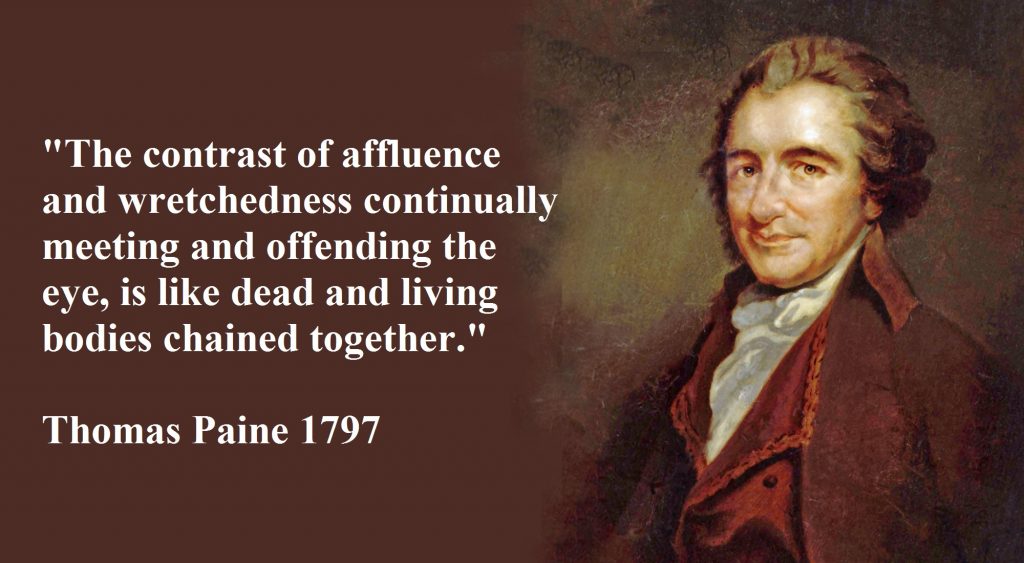
Geoffrey M. Hodgson
Once upon a time, all socialists saw the ‘common ownership of the means of production, distribution and exchange’ as their primary aim. Many die-hards still do.
Others now focus instead on reducing inequalities of power, wealth and income. Some past or present contenders for leadership of the UK Labour Party, including Yvette Cooper and Owen Smith, have argued that the party’s aims in Clause Four of its constitution, should be rewritten to give greater emphasis to equality.
Smith has gone even further, to declare that Labour should focus on ‘equality of outcomes’ and not simply equality of opportunity. He proposed a wealth tax and an increase of the top rate of income tax to 50 per cent. Jeremy Corbyn’s leadership team claimed that they had already adopted these policies.
 Given the huge and growing inequalities within modern capitalism, this focus on inequality is a positive move. But concern about inequality has never been confined to socialism. Ritual incantation of the aim for a ‘socialist’ future within the Labour Party may divert attention from measures that can be implemented within capitalism and without widespread common ownership.
Given the huge and growing inequalities within modern capitalism, this focus on inequality is a positive move. But concern about inequality has never been confined to socialism. Ritual incantation of the aim for a ‘socialist’ future within the Labour Party may divert attention from measures that can be implemented within capitalism and without widespread common ownership.
We also need to look at the basic drivers of inequality within capitalism. We must consider what can be done, within this system, and short of some mythical socialist future.
The practicalities of trying to reduce inequality within capitalism have to be addressed. If higher taxes are part of the solution, then somehow, in a democracy, people have to be persuaded to adopt them. Additional measures to help reduce inequality should be devised.
Furthermore, talk of ‘equality of outcomes’ is ill-advised. Are we really going to give everyone the same income and wealth, thus removing incentives for creativity and hard work? Is the communist utopia – ‘from each according to his ability, to each according to his need’ – practical, or even desirable?
The aim should be to dramatically reduce inequality, not to eliminate it. Incentives for hard work and enterprise should be retained.
Shifting the focus from common ownership to the reduction of inequality is an important step forward. But the analysis of causes, and the design of policy, have to be much more sophisticated.
The problem of inequality
At least nominally, capitalism embodies and sustains an Enlightenment agenda of freedom and equality. Typically there is freedom to trade and equality under the law, meaning that most adults – rich or poor – are formally subject to the same legal rules. But with its inequalities of power and wealth, capitalism darkens this legal equivalence.
Richard Wilkinson and Kate Pickett showed multiple deleterious effects of inequalities of income and wealth. Using data from twenty-three developed countries and from the separate states of the United States, they observed negative correlations between inequality, on the one hand, and physical health, mental health, education, child well-being, social mobility, trust and community life, on the other hand. They also found positive correlations between inequality and drug abuse, imprisonment, obesity, violence, and teenage pregnancies. They suggested that inequality creates adverse outcomes through psycho-social stresses generated through interactions in an unequal society.
 Although economic inequality is endemic to capitalism, data gathered by Thomas Piketty in his Capital in the Twentieth Century, and by me in my book entitled Conceptualizing Capitalism, show that there are large variations in measures of inequality in different major capitalist countries, and through time. The existence of such variety within capitalism suggests that it possible to alleviate inequality, to a significant degree, within capitalism itself.
Although economic inequality is endemic to capitalism, data gathered by Thomas Piketty in his Capital in the Twentieth Century, and by me in my book entitled Conceptualizing Capitalism, show that there are large variations in measures of inequality in different major capitalist countries, and through time. The existence of such variety within capitalism suggests that it possible to alleviate inequality, to a significant degree, within capitalism itself.
But first we must be clear about the drivers of inequality within the system. What are the mechanisms within capitalism that exacerbate inequalities of income or wealth?
Some inequality results from individual differences in talent or skill. But this cannot explain the huge gaps between rich and poor in many capitalist countries. Much of the inequality of wealth found within capitalist societies results from inequalities of inheritance. The process is cumulative: inequalities of wealth often lead to differences in education, economic power, and further inequalities in income.
Do markets create inequality?
To what extent can inequalities of income or wealth be attributed to the fundamental institutions of capitalism, rather than a residual landed aristocracy, or other surviving elites from the pre-capitalist past? A familiar mantra is that markets are the source of inequality under capitalism. Can markets be blamed for inequality?
In real-world markets different sellers or buyers vary hugely in their capacities to influence prices and other outcomes. When a seller has sufficient saleable assets to affect market prices, then strategic market behaviour is possible to drive out competitors.
Would more competition, with greater numbers of market participants, fix this problem? If markets per se are to be blamed for inequality, then it has to be shown that competitive markets also have this outcome. Unless we can demonstrate their culpability, blaming competitive markets for inequalities of success or failure might be like blaming the water for drowning a weak swimmer.
To demonstrate that competitive markets are a source of inequality we would have to start from an imagined world where there was initial equality in the distribution of income and wealth, and then show how markets led to inequality. I know of no such theoretical explanation.
Markets involve voluntary exchange, where both parties to an exchange expect benefits. One party to the exchange may benefit more than the other; but there is no reason to assume that individuals who benefit more, or benefit less (in one exchange) will generally do so. And if some traders become more powerful in the market than others, then its competitiveness is reduced.
The sources of inequality within capitalism
So if markets per se are not the root cause of inequality under capitalism, then what is? A clear answer to this question is vital if effective policies to counter inequality are to be developed. Capitalism builds on historically-inherited inequalities of class, ethnicity, and gender. By affording more opportunities for the generation of profits, it may also exaggerate differences due to location or ability. Partly through the operation of markets, it can also enhance positive feedbacks that further magnify these differences. But its core sources of inequality lie elsewhere.
 Because waged employees are not slaves, they cannot use their lifetime capacity for work as collateral to obtain money loans. The very commercial freedom of workers denies them the possibility to use their labour assets or skills as collateral.
Because waged employees are not slaves, they cannot use their lifetime capacity for work as collateral to obtain money loans. The very commercial freedom of workers denies them the possibility to use their labour assets or skills as collateral.
By contrast, capitalists may use their property to make profits, and as collateral to borrow money, invest and make still more money. Differences become cumulative, between those with and without collateralizable assets, and between different amounts of collateralizable wealth. Even when workers become home-owners with mortgages, the wealthier can still race ahead.
Unlike owned capital, free labour power cannot be used as collateral to obtain loans for investment. At least in this respect, capital and labour do not meet on a level playing field, this asymmetry is a major driver of inequality.
The foremost generator of inequality under capitalism is not markets but capital. This may sound Marxist, but it is not. I define capital differently from Marx and from most other economists and sociologists. My definition of capital corresponds to its enduring and commonplace business meaning. (Piketty’s definition is also similar to mine.) Capital is money, or the realizable money-value of collateralizable property. Unlike labour, capital can be used as collateral and the loan obtained can help generate further wealth.
Because workers are free to change jobs, employers have diminished incentives to invest in the skills of their workforce. Especially as capitalism becomes more knowledge-intensive, this can create an unskilled and low-paid underclass and further exacerbate inequality, unless compensatory measures are put in place. A socially-excluded underclass is observable in several developed capitalist countries.
Another source of inequality results from the inseparability of the worker from the work itself. By contrast, the owners of other factors of production are free to trade and seek other opportunities while their property makes money or yields other rewards. This puts workers at a disadvantage. Through positive feedbacks, even slight disadvantages can have cumulative effects.
None of these core drivers of inequality can be diminished by extending markets or increasing competition. These drivers are congenital to capitalism and its system of wage labour. If capitalism is to be retained, then the compensatory arrangements that are needed to counter inequality cannot simply be extensions of markets or private property rights.
These ineradicable asymmetries between labour and capital mean that ultra-individualist arguments against trade unions are misconceived. In a system that is biased against them, workers have a right to organize and defend their rights, even if it reduces competition in labour markets.
The relevance of Thomas Paine
Contrary to a widespread myth, Thomas Paine (1737-1809) was a liberal rather than a socialist. There is no support for common ownership in his writings. Instead he support private enterprise and a market economy.
But over two hundred years ago, he set out arguments and methods for reducing inequality. Paine recognised that ownership of property was vital, to provide incentives for the generation of wealth and to provide a means for its fairer distribution.
Paine argued for an inheritance tax, but balanced this by a grant to each adult at reaching the age of maturity. In this way, wealth would be recycled from the dead to the young, providing greater equality of opportunity across the board. Paine also advocated welfare provision and a guaranteed pension for those over 50.
Much of the wealth in Paine’s time was in land. Land and buildings are immobile, and can be readily assessed and taxed. But capital is fleet-footed and covert: it can be easily moved around the world or hidden in foreign accounts. Land ownership is still highly concentrated in a few hands, along with much additional wealth.
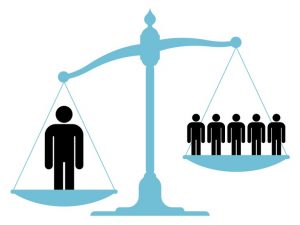 Today we face problems of inequality even greater than those addressed by Paine. In the USA, the richest 1 per cent own 34 per cent of the wealth and the richest 10 per cent own 74 per cent of the wealth. In the UK, the richest 1 per cent own 12 per cent of the wealth and the richest 10 per cent own 44 per cent of the wealth. In France the figures are 24 cent and 62 per cent respectively. The richest 1 percent own 35 percent of the wealth in Switzerland, 24 per cent in Sweden and 15 percent in Canada.
Today we face problems of inequality even greater than those addressed by Paine. In the USA, the richest 1 per cent own 34 per cent of the wealth and the richest 10 per cent own 74 per cent of the wealth. In the UK, the richest 1 per cent own 12 per cent of the wealth and the richest 10 per cent own 44 per cent of the wealth. In France the figures are 24 cent and 62 per cent respectively. The richest 1 percent own 35 percent of the wealth in Switzerland, 24 per cent in Sweden and 15 percent in Canada.
Although there are important variations, other developed countries show similar patterns of inequality within this range. The problem is extreme in the USA. Lower levels of inequality elsewhere are far from satisfactory, but they indicate what might be politically feasible for the currently more unequal countries.
Spreading property
Bruce Ackerman and Anne Alstott took up Paine’s agenda in their proposal for a ‘stakeholder society.’ They argued that ‘property is so important to the free development of individual personality that everybody ought to have some’. They echoed Francis Bacon: ‘Wealth is like muck. It is not good but if it be spread.’
 To this end, home ownership is of positive value, as a means of widely extending ownership of collateralizable property. But there also needs to be a substantial amount of social housing available for rent, to cater for those unable to afford to buy their own homes.
To this end, home ownership is of positive value, as a means of widely extending ownership of collateralizable property. But there also needs to be a substantial amount of social housing available for rent, to cater for those unable to afford to buy their own homes.
Significantly, the Right has promoted home ownership, while it has often been rebutted by the Left. This resistance comes from the Left’s old-fashioned, over-extended collectivism. By contrast, it is important for the Left to champion home ownership within an egalitarian and redistributive political programme.
When Margaret Thatcher introduced the ‘right to buy’ for tenants in social housing in 1980, Labour responded in its 1983 General Election Manifesto with a pledge to reverse these sales. But by 1985 Labour had abandoned this position.
Recycling wealth across generations
Ackerman and Alstott stressed progressive taxes on wealth rather than on income. Echoing Paine, they proposed a large cash grant to all citizens when they reach the age of majority, around the benchmark cost of taking a bachelor’s degree at private university in the United States. This grant would be repaid into the national treasury at death. To further advance redistribution, they argued for the gradual implementation of an annual wealth tax of two percent on a person’s net worth above a threshold of $80,000. Like Paine, they argued that every citizen has the right to share in the wealth accumulated by preceding generations. A redistribution of wealth, they proposed, would bolster the sense of community and common citizenship.
 Increased wealth or inheritance taxes are likely to be unpopular because they are perceived as an attack on the wealth that we have built up and wish to pass on to our children or others of our choice. But the brilliance of Paine’s 1797 proposal for a cash grant at the age of majority is that it offers a quid-pro-quo for wealth or inheritance taxes at later life.
Increased wealth or inheritance taxes are likely to be unpopular because they are perceived as an attack on the wealth that we have built up and wish to pass on to our children or others of our choice. But the brilliance of Paine’s 1797 proposal for a cash grant at the age of majority is that it offers a quid-pro-quo for wealth or inheritance taxes at later life.
People will be more ready to accept wealth taxation if they have earlier benefitted from a large cash grant in their youth. Wealth would by recycled to younger generations rather than syphoned away. The more fortunate or successful can be persuaded to give up some of their advantages if they see the benefits for society as a whole.
A related proposal, also redolent of Paine, was launched by the British Labour Government in 2005. It introduced a Child Trust Fund with the aim of ensuring every child has savings at the age of 18, giving every child a financial boost that they could use for the purposes of education or enterprise. Children received an initial £250 subscription from the government. Family and friends could top up these trust funds. The child would attain control of the fund at age 18. Withdrawals could then be made but be exempt from taxation. A weakness of this particular scheme was its timidity. A greater government subscription would have been more redistributive and egalitarian in its consequences. Child Trust Funds were opposed by the Conservatives and the Liberal Democrats, and abolished after they came to power in a coalition in 2010.
Extending education and share ownership
In the economy, there are many ways of spreading power and influence more broadly. The idea of extending employee shareholding is growing in popularity. This is a flexible strategy for extending ownership of revenue-producing assets in society. In the USA alone, over ten thousand enterprises, employing over ten million workers, are part of employee-ownership, stock bonus, or profit-sharing schemes. Employee ownership can increase incentives, personal identification with the enterprise, and job satisfaction for workers. The evidence suggests that when employee-ownership schemes and some employee participation in decision-making are combined, greater increases in profitability and productivity can be obtained.
As modern capitalist economies become more knowledge-intensive, access to education to develop skills becomes all the more important. Those deprived of such education suffer a degree of social exclusion, and, unless it is addressed, this problem is likely to get worse. Widespread skill-development policies are needed, alongside integrated measures to deal with job displacement and unemployment.
A universal basic income
The need for ongoing education is one argument for a basic income guarantee. Such a basic income would be paid to everyone out of state funds, irrespective of other income or wealth, and whether the individual is working or not. It is justified on the grounds that individuals require a minimum income to function as free and choosing agents. The basic means of survival are necessary to make use of our liberty, to have some autonomy, to function as effective citizens, to develop ethically, and to participate in civil society. These are conditions of adequate and educated inclusion in the market world of choice and trade.
A basic income would also reward otherwise unpaid work in care for the sick or elderly, which is often performed within families. A basic income would also encourage new entrepreneurs and creative artists. There would also be a huge saving in administration costs of often complex social security and welfare schemes. The level of the basic income does not have to be high. It can be set as a basic minimum for survival, thus retaining strong incentives for most people to seek additional sources of income.
Some forms of unconditional basic income have been pledged or introduced in several countries, including Brazil and Finland. Several developed countries have legal minimum income entitlements. In 1968, James Tobin, Paul A. Samuelson, John Kenneth Galbraith, and another twelve hundred economists signed a document calling for the US Congress to introduce a system of income guarantees and supplements. Winners of the Nobel Prize in Economics who fully support a basic income include Milton Friedman, Friedrich Hayek, James Meade, Herbert Simon, and Robert Solow. Significantly, this idea cuts across the political spectrum.
Conclusion
A key challenge for modern capitalist societies, alongside the needs to protect the natural environment and enhance the quality of life, is to retain the dynamic of innovation and investment while ensuring that the rewards of the global system are not returned largely to the richer owners of capital. As Paine put it in 1797:
All accumulation, therefore, of personal property, beyond what a man’s own hands produce, is derived to him by living in society; and he owes on every principle of justice, of gratitude, and of civilization, a part of that accumulation from whence the whole came.
But the benefits of ‘living in society’ are not simply through the advantages of cooperation or the division of labour. Modern societies have developed complex institutions that have empowered innovations and massive expansions of wealth. The ultimate and indivisible accumulation is not simply of things, but of knowledge, relations and rules, guarded by law within an adaptable and pluralist polity.
We need to update Paine’s approach to dealing with inequality, to suit modern times.
30 July 2016
Edited 31 July 2016
|
My forthcoming book elaborates on some of the political issues raised in this blog:
Wrong Turnings: How the Left Got Lost
To be published by University of Chicago Press in November 2017
|
Bibliography
Ackerman, Bruce and Alstott, Anne (1999) The Stakeholder Society (New Haven, CT: Yale University Press).
Atkinson, Anthony B. (2015) Inequality: What Can Be Done? (Cambridge MA: Harvard University Press).
Bowles, Samuel and Gintis, Herbert (1999) Recasting Egalitarianism: New Rules for Markets, States, and Communities (London: Verso).
Bowles, Samuel and Gintis, Herbert (2002) ‘The Inheritance of Inequality’, Journal of Economic Perspectives, 16(3), Summer, pp. 3-30.
Claeys, Gregory (1989) Thomas Paine: Social and Political Thought (London and New York: Routledge).
Credit Suisse Research Institute (2012) Credit Suisse Global Wealth Databook 2012 (Zurich: Credit Suisse Research Institute).
Hodgson, Geoffrey M. (2015) Conceptualizing Capitalism: Institutions, Evolution, Future (Chicago: University of Chicago Press).
Paine, Thomas (1797) Agrarian Justice: Opposed to Agrarian Law and to Agrarian Monopoly (Philadelphia: Folwell).
Paine, Thomas (1945) The Complete Writings of Thomas Paine, edited and introduced by Philip S. Foner (New York: Citadel Press).
Piketty, Thomas (2014) Capital in the Twenty-First Century (Cambridge, MA: Belknap Press).
Robinson, Andrew M. and Zhang, Hao (2005) ‘Employee Share Ownership: Safeguarding Investments in Human Capital’, British Journal of Industrial Relations, 43(3), September, pp. 469-88.
Wilkinson, Richard and Pickett, Kate (2009) The Spirit Level: Why More Equal Societies Almost Always Do Better (London: Allen Lane).
Posted in Common ownership, Jeremy Corbyn, Labour Party, Left politics, Liberalism, Markets, Nationalization, Politics, Private enterprise, Right politics, Socialism, Uncategorized
July 23rd, 2016 by geoffhodgson1946

A Worker Cooperative in New York City
Geoffrey M. Hodgson
‘The question we ask today is not whether our government is too big or too small, but whether it works … Nor is the question before us whether the market is a force for good or ill. Its power to generate wealth and expand freedom is unmatched.’
Barack Obama, 2009.
Politicians engage in slogans and sound-bites, but sometimes they reveal their true aims.
The Labour Party is now immersed in a battle for its leadership, and possibly for its survival as a viable political party. Jeremy Corbyn, overwhelmingly elected as leader in 2015 by about sixty per cent of the party membership, has lost the confidence of about eighty per cent of the party’s MPs.

Owen Smith
Owen Smith, Corbyn’s challenger for the Labour leadership, once worked for the private, research-based, pharmaceutical company Pfizer. In response, Corbyn and his allies have been quick to condemn Smith’s association with private enterprise.
Corbyn has always been a supporter of the original version of Labour’s Clause Four, with its aim of ‘common ownership of the means of production, distribution and exchange’. But since he became Labour Leader, he has kept this long-term aim mostly under wraps, highlighting his opposition to austerity economics instead.
However, on 21 July 2016, we had a brief peep under the tarpaulin, showing us Corbyn’s real aims.
Corbyn’s opposition to privately-funded pharmaceutical research
 The Association of the British Pharmaceutical Industry (ABPI) – the trade association for over 120 UK companies producing prescription medicines – quickly responded with a statement questioning Corbyn’s judgement in this area.
The Association of the British Pharmaceutical Industry (ABPI) – the trade association for over 120 UK companies producing prescription medicines – quickly responded with a statement questioning Corbyn’s judgement in this area.
The ABPI pointed out that the pharmaceutical industry invests more than £88bn a year into research and development for new medicines and vaccines to help fight disease. In the UK this equates to £4.1bn per year of investment in R&D, with the Medical Research Council contributing £770m and research charities £1.3bn.
The pharmaceutical industry is global, and it is difficult to see how the taxpayer-funded UK Medical Research Council could take over the roles of the large private players in this sphere, unless this research was dramatically diminished. As the ABPI pointed out, research in this area has to be a collaboration between industry researchers, academics and clinicians, involving both public and private institutions.
Many successes in the development of drug treatments – including for breast cancer and HIV – have involved collaborations between research-oriented universities, risk-taking companies, concerned charities, government agencies, and so on. Typically these collaborations involve complex synergies and are international in scope.
Corbyn’s proposal that modern levels of pharmaceutical research should be publicly rather than privately funded – within one country – is feasible in neither budgetary nor practical terms.2
But further, in his zeal for the public takeover of research and development, Corbyn has failed to learn one of the crucial economic lessons of the twentieth century, concerning the limitations of largely publicly-owned R&D and need more broadly for a healthy, innovative, private sector.
This lesson is sketched out later below. It concerns the vital role of different forms of private enterprise – from corporations to worker cooperatives, which all have legal autonomy and they sell their products on a market. But first we emphasise that the essential role of the state and the public sector.
The state and the public sector are vital
We should also understand the vital role of the public sector in modern capitalist economists, including in the sphere of research. Numerous authors, including Richard Nelson, Ha-Joon Chang, Erik Reinert, Mariana Mazzucato and myself, have argued that – for several reasons – the state plays an essential, supportive role within modern capitalism.
 In practical terms, evidence shows that the most successful economies are those that involve a collaboration of public and private institutions, including for research, development and innovation.
In practical terms, evidence shows that the most successful economies are those that involve a collaboration of public and private institutions, including for research, development and innovation.
For example, the modern patent system is backed up by legal and state powers that protect innovations from plagiarism and provide incentives for private research and creativity. It is an example of the way in which the state can maintain institutions that encourage private research.
There are areas where private enterprise works best, and there are areas where the public sector can be usefully involved. Determining these best areas in each case, is a practical question, involving detailed, complex, ongoing, empirical examination and experimentation.
Instead, Corbyn resorts to ideology, with this prescription: public ownership works best, and even when in doubt, nationalize. This is the mirror image of free-market ideologists, who stipulate: markets work best, and even when in doubt, privatize.
A simplistic ideological debate between private and public ownership dominated the twentieth century. The ‘common ownership’ version of Labour’s Clause Four, which lasted from 1918 to 1995, expressed one side in the debate. Margaret Thatcher and Ronald Reagan, among many others, took the other side.
A key lesson of the twentieth century is that the dichotomy between public and private provision is misleading. The key question is how they can be usefully combined. Within any useful combination, both private and public enterprise have a crucial role to play. This essay explains why a private sector is vital.
My recent book entitled Conceptualizing Capitalism explains why the role of the state is also crucial, even to sustain the institutions that make private enterprise work. But here I concentrate on the case for private enterprise.
The failure of centrally-planned innovation
Any vision of a large-scale planned economy involves assembling information in local or national agencies, and then making decisions based on this information. Proposed innovations and other changes must be appraised, and decisions on their viability must be made.
In their schemes to bring all knowledge together into the hands of planners, advocates of comprehensive planning overlook the time and other difficulties involved in gathering and dealing with available information. Also they give inadequate consideration to how innovations are to be incentivized, tested and promoted.
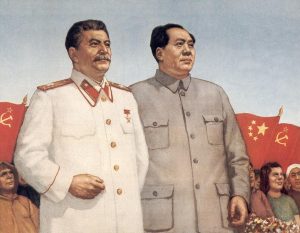 Innovation depends on hunches about the future. Successful innovation takes into account local, tacit and other knowledge concerning circumstances and possibilities. Much of this knowledge involves complex details and contexts, and cannot all be brought together and utilized by a central committee or planning authority.
Innovation depends on hunches about the future. Successful innovation takes into account local, tacit and other knowledge concerning circumstances and possibilities. Much of this knowledge involves complex details and contexts, and cannot all be brought together and utilized by a central committee or planning authority.
Because of diminished competitive pressures, nationalized industries in centrally planned economies, such as the Soviet Union and Mao’s China, have been unimpressive in terms of innovation and flexibility. Why should a committee back innovation or change, especially when it carries risks of failure? Why should they risk their jobs when they have no secure right of additional reward in the case of success?
The economist Peter Murrell showed empirically that the former Communist countries were apparently no less efficient in allocating resources than capitalist economies. Where they lagged was in terms of dynamic efficiency: the ability to innovate. This shortfall is endemic to any system that works on the basis of hierarchical planning, rather than independent enterprise with legal rights to reap and retain rewards.
Whatever the limitations of a market system, it has the advantage that it does not require majority agreement before a decision can be made to produce or distribute a good or service. Private property and contracts permit zones of autonomy within an interrelated system; agents may reach decisions through negotiated contracts with others. The costs and benefits are devolved to individuals or firms.
Through private enterprise it is possible for many technological or institutional innovations to be pioneered without the prior agreement of (democratic) committees or (undemocratic) bureaucrats. This analysis is borne out by experience. The former Soviet-type economies in Russia and China lacked devolved autonomy, secured by private ownership.
Eventually they learned that lesson. The change in China was most dramatic. After the Communist Revolution of 1949, agriculture in China was organized into large collective farms. Other than by threats and bureaucratic bullying, farmers had little incentive to improve productivity. Risky innovation was unwise. Productivity remained low and often there were shortages of food. But Mao Zedong died in 1976, opening up the possibility of reform.
 In 1978 some Chinese peasant farmers decided to withdraw from collective farms and take responsibility for production at the household level, where the household (instead of the collective) received the revenue from its sold output. Individual households had much greater incentives to work harder and to innovate. After decades of slow growth under Mao, China’s explosive economic growth began with those changes in rural areas. As a result, unprecedented millions were lifted out of poverty.
In 1978 some Chinese peasant farmers decided to withdraw from collective farms and take responsibility for production at the household level, where the household (instead of the collective) received the revenue from its sold output. Individual households had much greater incentives to work harder and to innovate. After decades of slow growth under Mao, China’s explosive economic growth began with those changes in rural areas. As a result, unprecedented millions were lifted out of poverty.
China’s spectacular economic growth began when agriculture began to pass into the private control of the peasants after 1978. The Chinese Communist Party endorsed these changes in the rights to use and manage land (while keeping legal title to the land in the hands of the collectives), and also promoted private businesses in rural areas.
China also retained many state-owned enterprises. The state continued to play a major strategic role in economic development. China has demonstrated how viable public and private sectors are essential for growth and innovation in a modern large-scale economy.
The failure of classic socialism
Some version of socialism might work on a small scale. Cooperation can work in this context, based on close, inter-personal interactions. Humans have co-operated in this way, in families and tribal groups, for many thousands of years.

Elinor Ostrom
Nobel Laureate Elinor Ostrom studied the management of common-pool resources – such as medieval common land, fisheries or agricultural irrigation schemes – and showed how they can be effectively managed by relatively small local communities.
Their small size allows participants to monitor each other, to ensure that necessary tasks are carried out and that the interests of the community are served.
Enforcement mechanisms range from praise to punishment. Within these relatively small and cohesive groups, trust and targeted sanctions are mechanisms for encouraging cooperation, reciprocity and compliance with customary rules.
But socialism on a small scale would lack the economies of large-scale production and the technological dynamism of today’s competitive capitalism. Modern medicines and technologically-advanced treatments, requiring extensive funding, risk-taking and research collaboration, could not be developed. With inferior drugs and healthcare, human longevity would be lower than it is today.
In larger socialist societies, individual incentives for effort and innovation are diminished, and compensatory, face-to-face, trust-based mechanisms to sustain cooperation are relatively less effective. When we move from communities of a hundred or so, where it is possible for everyone to know everyone else, to communities of thousands or more, then interpersonal trust and reputation are much less effective at the overall level, and they have to be supplement both other incentives and constraints.
When thousands of people are brought together, and rewards are shared, then there is less incentive to make the extra effort, because the rewards from that additional work would be hugely diluted.
Large private corporations face this problem too. But competitive pressure on the private corporation obliges it to incentivise its workforce in some way, so that most employees pull their weight.
Market competition is absent or much diminished in a centrally planned economy. Instead, the pressure to perform comes from the state. Consequently, strong discipline is necessary to sustain production, and larger-scale socialism engenders authoritarianism and bureaucracy. Twentieth-century evidence strongly supports this analysis.
Those that propose ‘democratic socialism’ in large-scale societies fail to address some key practical questions. How is all the important information to be gathered and transmitted? How are resources to be produced and distributed? How is everyone to be incentivized to work well and to innovate? And if the system is to be ‘democratic’, how would it be possible for everyone involved to vote on every important decision?

Robert Owen
Such practical considerations show that democratic socialism (at least in the classic sense of Robert Owen and Karl Marx, who proposed common ownership and the abolition of private enterprise) is unfeasible in any large-scale complex economy.
While interpersonal interactions can engender cooperation on a small scale, in large-scale societies other mechanisms and incentives are necessary. For dynamism and efficiency, there have to be competition, markets and a large private sector, as well as a state.
Private ownership is also important for political reasons, to create zones of politico-economic power that can countervail state autocracy.
Contrary to the twin, all-or-nothing, ideologies of classical socialism and free-market purism, this leaves open a huge area for economic reform and development. A private sector can be made up of many different kinds of enterprise, including worker cooperatives and social enterprises, as well as more conventional corporations. The state can intervene in a myriad of ways, including the adoption of redistributive taxation and the development of a strong welfare state.
Once all this is understood, then the game changes – irrevocably. Once it is realized that classical socialism cannot work (at least in a humane way) then you have to look for alternatives. Once it is acknowledged that private property and markets are indispensable in large-scale modern economies, then you have to accept them, warts and all. The best that can be done is to minimize their deleterious effects, and to explore viable avenues of institutional reform.
Much of the Labour Party learned this lesson in the era from 1945 to 2015. It adjusted to the mixed economy and began to understand the virtues and indispensability of private enterprise. That lesson seems to be forgotten by a large number of Labour Party members, who continue to support Corbyn and his naïve, outdated ideology. Unless that lesson is learned again, and quickly, then Labour has no future as an electable political party.
23 July 2016
Edited 24 July 2016
|
My forthcoming book elaborates on some of the political issues raised in this blog:
Wrong Turnings: How the Left Got Lost
To be published by University of Chicago Press in November 2017
|
-
Corbyn added that he was in favour of a National Health Service that is ‘totally public’ with ‘publicly employed people running it’. Is he aware that GPs are not NHS employees but self-employed contractors? If so, is it his intention to make all GPs employees?
-
In an interview on 24 July 2016, Corbyn’s ally John McDonnell backtracked on his leader’s statement, re-admitting a role for private sector pharmaceutical research under some vague notion of ‘democratic control’. He said that Corbyn’s statement had been ‘misinterpreted’. But this dishonest manoeuvring under pressure fails to mask their true aims.
Bibliography
Chang, Ha-Joon (2002) Kicking Away the Ladder: Development Strategy in Historical Perspective (Anthem Press: London).
Hayek, Friedrich A. (1944) The Road to Serfdom (London: George Routledge).
Mazzucato, Mariana (2013) The Entrepreneurial State: Debunking Public vs. Private Sector Myths (London and New York: Anthem).
Murrell, Peter (1991) ‘Can Neoclassical Economics Underpin the Reform of Centrally Planned Economies?’ Journal of Economic Perspectives, 5(4), Fall, pp. 59-76.
Nelson, Richard R. (1981) ‘Assessing Private Enterprise: An Exegesis of Tangled Doctrine’, Bell Journal of Economics, 12(1), pp. 93-111.
Nelson, Richard R. (2003) ‘On the Complexities and Limits of Market Organization’, Review of International Political Economy, 10(4), November, pp. 697-710.
Ostrom, Elinor (1990) Governing the Commons: The Evolution of Institutions for Collective Action (Cambridge: Cambridge University Press).
Reinert, Erik S. (2007) How Rich Countries Got Rich … And Why Poor Countries Stay Poor (London: Constable).
Zhou, Kate Xiao (1996) How the Farmers Changed China (Boulder, CO: Westview Press)
Posted in Common ownership, Jeremy Corbyn, Labour Party, Left politics, Liberalism, Markets, Nationalization, Politics, Private enterprise, Right politics, Robert Owen, Socialism, Uncategorized
July 14th, 2016 by geoffhodgson1946

Originally posted 14 July 2016
“A lucid and persuasive piece” – Richard Surr
“A very thoughtful and informative article” – John Boughton
“A frank and thought-provoking assessment” – John Hill
“An excellent and thought-provoking article” – Michael Kelly
“A great read” – Graham Sutton
Geoffrey M. Hodgson
12 July 2016 will go down in UK history for two major political events. First, it was the last full day that David Cameron was Prime Minister. Second, the National Executive Committee of the Labour Party decided to put Jeremy Corbyn on the membership ballot for the party’s re-election of Labour’s leader, despite an overwhelming vote of no confidence against him by Labour MPs.
On this day, the Labour Party destroyed its chances of victory in the next general election. A party so deeply divided cannot win. For Labour, this is the most optimistic assessment: 12 July 2016 might come to be seen as the day that Labour died.
|
My latest book elaborates on some of the political issues raised in this blog:
Wrong Turnings: How the Left Got Lost
Published by the University of Chicago Press in January 2018
|
Progressive Left politics in Britain has to be rebuilt. It is as if the clock has been turned back 100 years. We must begin again.
Labour’s Grim Prospects
Labour now faces another election among its members for its Leader. Even with a strong and commanding alternative candidate, Corbyn is likely to win this contest. This would leave Labour as a party in Parliament where 80 per cent of its MPs have no confidence in its leader.
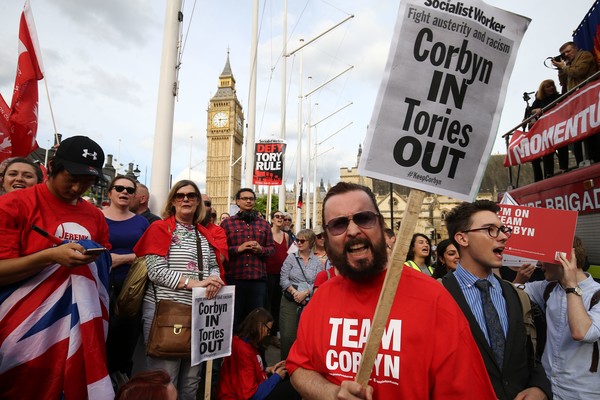 Consequently, all 172 of the ‘rebels’ would face possible deselection by their local constituency parties. Few would survive the show trials by Corbynistas for their alleged crimes. They would be replaced by hard-left stalwarts.
Consequently, all 172 of the ‘rebels’ would face possible deselection by their local constituency parties. Few would survive the show trials by Corbynistas for their alleged crimes. They would be replaced by hard-left stalwarts.
In a more optimistic scenario, suppose that Corbyn is defeated for Leader in the membership vote. At least then, the Parliamentary Labour Party and much of the Labour Party machine would be ostensibly in the same hands. But the party would be in civil war. It would become a cockpit of personal abuse and factional machination, unattractive to ordinary, thoughtful, soft-spoken, Labour supporters. Many of the so-called rebels would be deselected by the local parties that were in Corbynista hands.
Electorates are not fond of parties that are unable to quash their internal feuds. Voter want results – not rifts. The Tories are masters of the swift coup to end dissent. That is because they have a thirst for governmental power. Sadly, much of the Labour membership does not. They prefer to be ideologically pure. That is why Labour is dying. It looks likely to be pulverised in a general election. The chances of a majority Labour government have disappeared, at least for 2020 and maybe forever.
Will the Majority of Labour MPs Breakaway?
Assume that a large segment of Labour MPs breaks away and forms a new party. If their numbers were sufficient, then they could claim the official mantle of Her Majesty’s Opposition. They might outnumber the remaining parties, including the SNP and Corbyn’s Rump Labour. They would have to find a new name, be it ‘Social Democratic Labour’ or whatever.
Finding a name would be the least of their problems.
First the new party would have to be built up from the grassroots, in every winnable constituency. Then there would be the problem of party funding. Gaining credibility in Scotland would also be important.
The Global Crisis of Social Democracy
Added to all this is the global ideological crisis within social democracy itself. Social democracy was originally synonymous with socialism, where the latter meant an economy dominated by public enterprise and planning. Many of the early ‘social democratic’ parties were led by Marxists, including the Social Democratic Workers’ Party of Germany, founded in 1869. Although some social democrats favoured peaceful reform rather than violent revolution, they mostly agreed on the goal of large-scale common ownership.
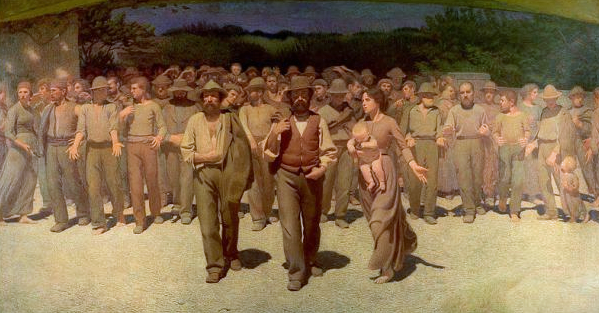
Social democracy began to change its meaning more substantially after 1945, especially when the German Social Democratic Party embraced private enterprise and a mixed economy in 1959. Today social democracy is often distinguished from socialism in terms of a stronger emphasis on a mixed economy and private enterprise, while retaining the goal of greater equality and social justice.
As Neal Lawson has pointed out, modern European social democracy was built during, and affected by, the Cold War of 1948-1991. It was also founded on a mass industrial working class. Until the 1970s there was a widespread concern the USSR might overtake the West in terms of productivity and economic prowess. Post-1945 social democracy was forged as a compromise between Soviet planning and market economy, within a democratic political system, based on the support of industrial workers and progressive intellectuals.
But the sixteen years from 1975 to 1991 saw this consensus collapse. The post-war political settlement, accepted by parties on the Left and Right, disappeared. In addition, de-industrialisation in the West and the shift of much manufacturing to East Asia, pulverised the traditional working class base. The collapse of the Berlin Wall in 1989 ended the Soviet Bloc and its experiment with socialism.

Fall of the Berlin Wall 1989
Consequentially, modern social democracy is now in crisis the world over. It is failing in government in France and it is in retreat almost everywhere else, including in its great heartlands in Northern Europe, and no less in Germany and Scandinavia.
Social democrats have been slow to adjust. As Lawson has argued, they have retained ‘their statism and tribalism, their urge to command and control’. They are ‘at odds with a zeitgeist that demands pluralism, complexity’. They failed to develop an adequate alternative vision of ‘a good society that is about much greater equality but is at odds with consumption without end.’
A problem shared by Marxist, ‘Labour’ and social-democratic parties is that they all stem from a post-Enlightenment, doctrinal offshoot (around Louis Blanqui and others in the 1830s) that focused on the interests and aspirations of the working class, rather than on those of humanity as a whole.
Marxism went furthest in this direction, with its doctrine of class struggle and the ‘dictatorship of the proletariat’. But the very name ‘Labour’ speaks to one class rather than to all humanity. One of the great lessons of the Enlightenment is that human rights are universal. Especially in our fractured world, political parties should have a universal appeal.
In particular, the very aim of greater economic equality should be seen not as an outcome of envy, struggle or revenge, but as a moral mission to make society more amenable and cohesive for all.
Class-based, social-democratic, mind-sets have dominated both the Left and Right of the Labour Party for the last seventy years. If the majority of Labour MPs try to build something out of the ruins, then they will face the profound problem of reconstructing their own philosophy and identity for the twenty-first century, alongside a myriad of other practical difficulties.
Radical Liberalism
I do not pretend that I have adequate answers, but I am sure that a new radical movement that faces the problems of the twenty-first century must build on the achievement of the political and scientific Enlightenment in the seventeenth and eighteenth centuries. Hence it must relate in some way to the broad liberal tradition that stems from this Enlightenment.
 This tradition emphasises democracy, liberty, equality and cooperation. Socialism derives from the Enlightenment, but has been neither consistent nor adequate in the pursuit of these goals.
This tradition emphasises democracy, liberty, equality and cooperation. Socialism derives from the Enlightenment, but has been neither consistent nor adequate in the pursuit of these goals.
In particular, the liberal tradition also recognises that private property is essential to a dynamic economy, notwithstanding the importance of state intervention in health, education, market regulation, redistribution and elsewhere. As the twentieth century shows us, some private property is a necessary (but insufficient) guarantee of liberty. Its abolition has without exception led to totalitarianism.
It is for the reason that one of the greatest achievements of liberal and Enlightenment thought, the United Nations Universal Declaration of Human Rights, includes these words: ‘Everyone has the right to own property alone as well as in association with others. No one shall be arbitrarily deprived of his property.’ Property, in short, is a basic human right.
At the same time, property-owning market economies have important limitations. These must be addressed without destroying private enterprise, competition and the well-springs of innovation and wealth. Greed and individualism must be countervailed by a recognition that, just as we have all benefitted from the work of others, we have a duty to society in return. Extreme inequalities of income and wealth are deleterious to social solidarity and cohesion, and these too must be tackled. This puts radical policies, such as a guaranteed basic income and some viable form of redistributive taxation, on the agenda.

Thomas Paine
Everything I mention in the previous paragraph was considered at length by the great Anglo-American radical Thomas Paine (1737-1809). Contrary to widespread belief, Paine was not a socialist. He was a radical liberal.
Take another relevant example. John Stuart Mill (1806-1873) was concerned about the problems of inequality, in wealth, power, voting rights and income. He advocated not simply a market economy but forms of cooperation, particularly worker cooperatives.
John A. Hobson (1858-1940), was a liberal and one of the great neglected economists of the last 150 years. He developed a theory of unemployment and opposed the imperialism of the great powers.
From 1908 to 1914 Herbert H. Asquith (1852-1928), as Liberal Prime Minister, led his party to a series of major reforms, including social insurance and the reduction of the power of the House of Lords. Asquith laid the foundations of the Britain’s welfare state. His Liberal successor, David Lloyd George (1863-1945), gave the vote to women in 1919 (but not on the same terms as men).
The Liberal Democrats
So why not join the Liberal Democrats?
Imagine we are back in 2005, with Charles Kennedy as Leader, but Labour in today’s mess. For many readers the Liberal Democrats would be an attractive option.
Kennedy became leader in 1999. His party won 52 seats in the 2001 election – their highest tally since 1923. He shifted his party to the Left and– unlike Labour and the Tories – the Liberal Democrats came out firmly against the 2003 invasion of Iraq. In the 2005 general election, 62 Liberal Democrats were elected. Kennedy stood down in 2006.
Nick Clegg became leader in 2007. After the economic crash of 2008, Clegg told his party at its 2009 annual conference that ‘savage cuts’ were needed to deal with the mounting budget deficit. When the 2010 election granted no single party an overall majority, Clegg argued that Labour was incapable of making the cuts in public expenditure that he deemed necessary. This was a key argument in persuading his party to join a coalition with the Tories. Kennedy voted against this coalition.
To some degree, the coalition did act as a check on the ideological, axe-wielding, Tory Right. They blocked, and postponed for five years, the dreadful mistake of the referendum on Europe. But the Liberal Democrats under Clegg made the serious mistake of willingly participating in a misconceived and highly damaging programme of cuts in vital public services and investment.
The Liberal Democrats also wrongly blamed Labour for overspending prior to the crash. In fact, Labour had the finances under control before 2008 and the big spending was needed after the crash, to save the financial system from collapse.
Clegg and other members of the Liberal Democrats had forgotten key lessons from their own history. Asquith learned the dangers of doing deals with the Tories. Lloyd George was cast aside by them in 1922 just as Clegg’s party was deliberately crushed by the Tory machine in the 2015 election.

John Maynard Keynes
Just as grave was the abandonment of Keynesianism by the Liberal Democrats. John Maynard Keynes (1883-1946) was a life-long Liberal and one of the greatest economists of all time. Keynes argued that the first priority of government was not the reduction of its deficit but the maximisation of employment. Through growth and greater employment a government could accrue greater income to resolve its budgetary problems. Attempts to deal with deficits by reducing government expenditure and austerity would be self-defeating: the economy would contract (or grow more slowly) and the deficit would increase.
The failure of a strategy of austerity has become abundantly clear in the six years that George Osborne was Conservative Chancellor of the Exchequer since 2010. The Liberal Democrats need to shout more loudly that they have learned that lesson.
Labour and the Liberal Democrats – Their Aims
Ever since Labour removed its commitment to common ownership from its constitution in 1995, its institutional aims have been unclear. The current Labour Party Constitution outlines commendable principles such as by ‘common endeavour we achieve more than we achieve alone’. It laudably aims for a society where ‘power, wealth and opportunity are in the hands of the many not the few’ and ‘where we live together freely, in a spirit of solidarity, tolerance and respect’.
But these words are too vague to provide a clear goal. They might be deemed consistent with a range of idealistic plans, from statist socialism to egalitarian ‘people’s capitalism’.
Labour’s current Clause Four Part One is silent on the question of property, whether it is to be private or owned in common. Reference to ‘a thriving private sector’ is tucked away in Part Two, alongside a mention of public ownership or accountability where ‘essential to the common good’.
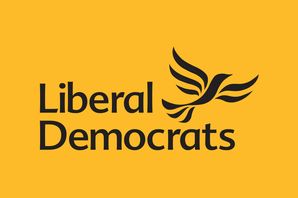 The Preamble to the Constitution of the Liberal Democrats is much clearer. It mentions ‘a strong and sustainable economy which encourages the necessary wealth creating processes, develops and uses the skills of the people and works to the benefit of all, with a just distribution of the rewards of success.’
The Preamble to the Constitution of the Liberal Democrats is much clearer. It mentions ‘a strong and sustainable economy which encourages the necessary wealth creating processes, develops and uses the skills of the people and works to the benefit of all, with a just distribution of the rewards of success.’
It continues: ‘We want to see democracy, participation and the co-operative principle in industry and commerce within a competitive environment in which the state allows the market to operate freely where possible but intervenes where necessary.’
It declares: ‘We will work for a sense of partnership and community in all areas of life. We recognise that the independence of individuals is safeguarded by their personal ownership of property, but that the market alone does not distribute wealth or income fairly. We support the widest possible distribution of wealth’.
This commitment to greater equality could be strengthened. There are other omissions, which have increased in importance in today’s multi-cultural Britain. They include measures for the development of social integration and cohesion, particularly by winding down state-funded faith schools.
No party is perfect, and we are obliged to compromise to get anywhere.
 In the current crisis, the Liberal Democrats have another strong card to play. Since 1959 they have been firmly in favour of (what is now called) the European Union. Labour was for withdrawal in 1983. Subsequently it changed its policy back to staying in. But Corbyn was in favour of leaving the EU until he became leader in 2015. His ambivalence during the referendum campaign was obvious.
In the current crisis, the Liberal Democrats have another strong card to play. Since 1959 they have been firmly in favour of (what is now called) the European Union. Labour was for withdrawal in 1983. Subsequently it changed its policy back to staying in. But Corbyn was in favour of leaving the EU until he became leader in 2015. His ambivalence during the referendum campaign was obvious.
The Liberal Democrats accept the result of the 2016 referendum but are pledged wholeheartedly to restore Britain’s strong ties with Europe, to the point of possible re-entry into the EU in the future.
So why not join the Liberal Democrats?
I just did.
I accept that others will try and retrieve something from the fragments of today’s Labour Party. Perhaps they can help build a base for progressive policies in the devastated former industrial areas, particularly in Wales and the North of England. I wish them success. We all need to work together to help make Britain and the world a better place.
14 July 2016
Bastille Day – liberté, égalité, fraternité.
Minor edits: 15-19 July 2016 and 17 August 2016.
Autobiographical Note
Born in 1946. Raised in rented council housing. Educated at state schools and at the University of Manchester. Member of the Labour Party, 1966-1968 and 1974-2001. Labour Parliamentary Candidate for Manchester Withington in 1979. Briefly advisor for Neil Kinnock and Roy Hattersley in the 1980s.
I left Labour over faith schools, inadequate House of Lords reform and neglect of economic inequality. Would have left over Iraq. Politically unaffiliated 2002-2016.
Bibliography
Claeys, Gregory (1989) Thomas Paine: Social and Political Thought (London and New York: Routledge).
Fishman, William J. (1970) The Insurrectionists (London: Methuen).
Hobson, John A. (1902) Imperialism: A Study (London: James Nisbet).
Mill, John Stuart (1848) Principles of Political Economy with Some of Their Applications to Social Philosophy (London: Parker).
Mummery, Albert F. and Hobson, John A. (1889) The Physiology of Industry (London: John Murray).
Waldron, Jeremy (1988) The Right to Private Property (Oxford and New York: Oxford University Press).
Posted in Common ownership, Democracy, Labour Party, Left politics, Liberalism, Nationalization, Politics, Socialism

 Of course, Muslims and others suffer significant discrimination, in
Of course, Muslims and others suffer significant discrimination, in  But much of the political debate is about immigrant numbers. The Tories ignore the economic evidence and start a Dutch auction of targets, to stem numbers. A large part of the Labour Party, facing a seepage of its working class support to UKIP, moves in a similar direction.
But much of the political debate is about immigrant numbers. The Tories ignore the economic evidence and start a Dutch auction of targets, to stem numbers. A large part of the Labour Party, facing a seepage of its working class support to UKIP, moves in a similar direction.


 After coming to power in 1997, Labour Prime Minister
After coming to power in 1997, Labour Prime Minister 


 After several years he renounced his former extremism, but retained his Islamic faith. In an interview he revealed the segregated life of his upbringing:
After several years he renounced his former extremism, but retained his Islamic faith. In an interview he revealed the segregated life of his upbringing: Some on the Far Left disowned Butt for betraying the struggle against “Western imperialism”. He was also criticized by one member of the “Stop the War” movement, who is a leading supporter of the Muslim Brotherhood, for his “call to change the face of Islam” (Cohen 2007, pp. 371-2).
Some on the Far Left disowned Butt for betraying the struggle against “Western imperialism”. He was also criticized by one member of the “Stop the War” movement, who is a leading supporter of the Muslim Brotherhood, for his “call to change the face of Islam” (Cohen 2007, pp. 371-2). But the official government document outlining this policy mentions respect and tolerance for other races but fails to mention discrimination against women or gays. It rightly mentions the freedom to “choose and hold” any faith, but not the freedom to exit a religion without sanction. It mentions “individual liberty” only once, and fails to uphold freedom of non-violent expression, including when it may cause offence.
But the official government document outlining this policy mentions respect and tolerance for other races but fails to mention discrimination against women or gays. It rightly mentions the freedom to “choose and hold” any faith, but not the freedom to exit a religion without sanction. It mentions “individual liberty” only once, and fails to uphold freedom of non-violent expression, including when it may cause offence. Another problem here is not the values as such, but their nationalistic description as “British”. Democracy was not invented in Britain: Ancient Athens and Viking Iceland have much earlier precursors. The US and France have much earlier claims to the values of liberty and religious tolerance. Britain legally discriminated against Protestant nonconformists and Catholics until the nineteenth century, and it still bars any Catholic from becoming its sovereign.
Another problem here is not the values as such, but their nationalistic description as “British”. Democracy was not invented in Britain: Ancient Athens and Viking Iceland have much earlier precursors. The US and France have much earlier claims to the values of liberty and religious tolerance. Britain legally discriminated against Protestant nonconformists and Catholics until the nineteenth century, and it still bars any Catholic from becoming its sovereign.





 Putting the blame on “neoliberalism” underestimates the way in which outsiders such as Trump and Farage have created populist movements that blame “the elite” and offer simplistic solutions, such as to “curb immigration”. Blaming “neoliberalism” underestimates the pernicious influences of racism and anti-Muslim prejudice.
Putting the blame on “neoliberalism” underestimates the way in which outsiders such as Trump and Farage have created populist movements that blame “the elite” and offer simplistic solutions, such as to “curb immigration”. Blaming “neoliberalism” underestimates the pernicious influences of racism and anti-Muslim prejudice. 


 Unlike any false claim that “neoliberalism” has reduced overall taxes, the increase of privatisation is manifest. In addition, it has sometimes led to deleterious consequences including lower pay for workers and a reduced quality of services.
Unlike any false claim that “neoliberalism” has reduced overall taxes, the increase of privatisation is manifest. In addition, it has sometimes led to deleterious consequences including lower pay for workers and a reduced quality of services.
 Ken Loach’s moving film, I, Daniel Blake, portrays the heart-breaking human consequences of the UK Conservative government’s shredding of the welfare safety net for the poor. Attempts to reduce public spending in many countries have led to millions of human tragedies like this.
Ken Loach’s moving film, I, Daniel Blake, portrays the heart-breaking human consequences of the UK Conservative government’s shredding of the welfare safety net for the poor. Attempts to reduce public spending in many countries have led to millions of human tragedies like this. All this is real, and tragic. Millions have suffered because of such misguided policies. But we should not jump to the conclusion that “neoliberalism” has been successful in moving toward a minimal economic role for the state.
All this is real, and tragic. Millions have suffered because of such misguided policies. But we should not jump to the conclusion that “neoliberalism” has been successful in moving toward a minimal economic role for the state.

 The first sentence is valid and important. The second is simplistic. As I elaborate in my book
The first sentence is valid and important. The second is simplistic. As I elaborate in my book  Impersonal relations occur in bureaucracies as well as in markets. Large-scale systems of national planning also make much interaction impersonal. People become atomised; they become numbers, to be processed by bureaucrats and computers.
Impersonal relations occur in bureaucracies as well as in markets. Large-scale systems of national planning also make much interaction impersonal. People become atomised; they become numbers, to be processed by bureaucrats and computers. But such nuances have been lost in a global storm of “neoliberal” accusations. Klein and Monbiot have added some force and authority to this widening tempest.
But such nuances have been lost in a global storm of “neoliberal” accusations. Klein and Monbiot have added some force and authority to this widening tempest.
 But feelings of possession are not the same thing as rights to property. The psychologist Lawrence Kohlberg pioneered the study of how individual humans develop an understanding of justice and morality from birth to adulthood.
But feelings of possession are not the same thing as rights to property. The psychologist Lawrence Kohlberg pioneered the study of how individual humans develop an understanding of justice and morality from birth to adulthood.




 But, despite superficial appearances to the contrary, there is evidence that legal systems and legal property rights matter. China’s explosive growth started when land-use (usus fructus) rights were widely conceded to the peasants after 1978. Local power from below tentatively established de facto powers, which spread widely and became de jure when they were legally ratified by the state.
But, despite superficial appearances to the contrary, there is evidence that legal systems and legal property rights matter. China’s explosive growth started when land-use (usus fructus) rights were widely conceded to the peasants after 1978. Local power from below tentatively established de facto powers, which spread widely and became de jure when they were legally ratified by the state.


 Jeremy Corbyn is very different from Nigel Farage and Donald Trump. Corbyn is neither a racist nor a misogynist (
Jeremy Corbyn is very different from Nigel Farage and Donald Trump. Corbyn is neither a racist nor a misogynist (




 Consider the example of the EU referendum in June 2016. After the result, Corbyn took it for granted that Britain should leave the EU and immediately trigger Brexit, irrespective of the outcome of Britain’s negotiations on the terms of leaving. Like his fellow-populist Farage, Corbyn accepted that ‘the people had spoken’. For him, the expression of popular will was the end of the matter.
Consider the example of the EU referendum in June 2016. After the result, Corbyn took it for granted that Britain should leave the EU and immediately trigger Brexit, irrespective of the outcome of Britain’s negotiations on the terms of leaving. Like his fellow-populist Farage, Corbyn accepted that ‘the people had spoken’. For him, the expression of popular will was the end of the matter.

 Trotskyists are socialists who believe in the common ownership of the means of production. This goal was stated in Labour’s Clause Four from 1918 to 1995, so why shouldn’t Trotskyists be allowed to join Labour?
Trotskyists are socialists who believe in the common ownership of the means of production. This goal was stated in Labour’s Clause Four from 1918 to 1995, so why shouldn’t Trotskyists be allowed to join Labour?

 Writing in 1918, Lenin described the desired ‘dictatorship of the proletariat’ as ‘rule based directly upon force and unrestricted by any laws. The revolutionary dictatorship of the proletariat is rule won and maintained by the use of violence by the proletariat against the bourgeoisie, rule that is unrestricted by any laws.’ Trotsky supported Lenin in this and most other respects.
Writing in 1918, Lenin described the desired ‘dictatorship of the proletariat’ as ‘rule based directly upon force and unrestricted by any laws. The revolutionary dictatorship of the proletariat is rule won and maintained by the use of violence by the proletariat against the bourgeoisie, rule that is unrestricted by any laws.’ Trotsky supported Lenin in this and most other respects. Throughout his life, Trotsky defended the decisions of the first four congresses of the Communist International, which took place when Lenin was alive and before Stalin seized power.
Throughout his life, Trotsky defended the decisions of the first four congresses of the Communist International, which took place when Lenin was alive and before Stalin seized power. First, by hanging on to the word ‘socialism’, after abandoning its original meaning, it is difficult to exclude those who are more genuinely socialist in the classical sense of common ownership. Labour’s obligatory (but now shallow) rhetoric of ‘socialism’ is a green light for socialist entryists of all kinds.
First, by hanging on to the word ‘socialism’, after abandoning its original meaning, it is difficult to exclude those who are more genuinely socialist in the classical sense of common ownership. Labour’s obligatory (but now shallow) rhetoric of ‘socialism’ is a green light for socialist entryists of all kinds. Of course, Labour in practice has put aside the notion that it is speaking for one section of society only. But its name remains a problem, both for broadening its appeal and for barring the more energetic and extreme exponents of working class representation and power.
Of course, Labour in practice has put aside the notion that it is speaking for one section of society only. But its name remains a problem, both for broadening its appeal and for barring the more energetic and extreme exponents of working class representation and power.

 Here is my own confession: fifty years ago I believed that socialism was ‘obvious’. Eventually I was persuaded otherwise. Initially, it was not my growing awareness of the horrendous consequences of the socialist experiments in Russia, China and elsewhere that jolted me.
Here is my own confession: fifty years ago I believed that socialism was ‘obvious’. Eventually I was persuaded otherwise. Initially, it was not my growing awareness of the horrendous consequences of the socialist experiments in Russia, China and elsewhere that jolted me. Nobel Laureate Elinor Ostrom studied the management of common-pool resources – such as medieval common land, fisheries or agricultural irrigation schemes – and showed how they can be effectively managed by relatively small local communities.
Nobel Laureate Elinor Ostrom studied the management of common-pool resources – such as medieval common land, fisheries or agricultural irrigation schemes – and showed how they can be effectively managed by relatively small local communities.
 Corbyn is right:
Corbyn is right:  There is a need for rules, monitoring and countervailing power. If all economic power is concentrated in the bureaucracy of planners, then will be no effective alternative power that can countervail.
There is a need for rules, monitoring and countervailing power. If all economic power is concentrated in the bureaucracy of planners, then will be no effective alternative power that can countervail. The great American politician Robert F. Kennedy once said:
The great American politician Robert F. Kennedy once said: Even small successes –
Even small successes – 
 Because waged employees are not slaves, they cannot use their lifetime capacity for work as collateral to obtain money loans. The very commercial freedom of workers denies them the possibility to use their labour assets or skills as collateral.
Because waged employees are not slaves, they cannot use their lifetime capacity for work as collateral to obtain money loans. The very commercial freedom of workers denies them the possibility to use their labour assets or skills as collateral. Today we face problems of inequality even greater than those addressed by Paine. In the USA, the richest 1 per cent own 34 per cent of the wealth and the richest 10 per cent own 74 per cent of the wealth. In the UK, the richest 1 per cent own 12 per cent of the wealth and the richest 10 per cent own 44 per cent of the wealth. In France the figures are 24 cent and 62 per cent respectively. The richest 1 percent own 35 percent of the wealth in Switzerland, 24 per cent in Sweden and 15 percent in Canada.
Today we face problems of inequality even greater than those addressed by Paine. In the USA, the richest 1 per cent own 34 per cent of the wealth and the richest 10 per cent own 74 per cent of the wealth. In the UK, the richest 1 per cent own 12 per cent of the wealth and the richest 10 per cent own 44 per cent of the wealth. In France the figures are 24 cent and 62 per cent respectively. The richest 1 percent own 35 percent of the wealth in Switzerland, 24 per cent in Sweden and 15 percent in Canada. To this end, home ownership is of positive value, as a means of widely extending ownership of collateralizable property. But there also needs to be a substantial amount of social housing available for rent, to cater for those unable to afford to buy their own homes.
To this end, home ownership is of positive value, as a means of widely extending ownership of collateralizable property. But there also needs to be a substantial amount of social housing available for rent, to cater for those unable to afford to buy their own homes. Increased wealth or inheritance taxes are likely to be unpopular because they are perceived as an attack on the wealth that we have built up and wish to pass on to our children or others of our choice. But the brilliance of Paine’s 1797 proposal for a cash grant at the age of majority is that it offers a quid-pro-quo for wealth or inheritance taxes at later life.
Increased wealth or inheritance taxes are likely to be unpopular because they are perceived as an attack on the wealth that we have built up and wish to pass on to our children or others of our choice. But the brilliance of Paine’s 1797 proposal for a cash grant at the age of majority is that it offers a quid-pro-quo for wealth or inheritance taxes at later life.

 The Association of the British Pharmaceutical Industry (ABPI) – the trade association for over 120 UK companies producing prescription medicines – quickly responded with a statement questioning Corbyn’s judgement in this area.
The Association of the British Pharmaceutical Industry (ABPI) – the trade association for over 120 UK companies producing prescription medicines – quickly responded with a statement questioning Corbyn’s judgement in this area. Innovation depends on hunches about the future. Successful innovation takes into account local, tacit and other knowledge concerning circumstances and possibilities. Much of this knowledge involves complex details and contexts, and cannot all be brought together and utilized by a central committee or planning authority.
Innovation depends on hunches about the future. Successful innovation takes into account local, tacit and other knowledge concerning circumstances and possibilities. Much of this knowledge involves complex details and contexts, and cannot all be brought together and utilized by a central committee or planning authority.

 Consequently, all 172 of the ‘rebels’ would face possible deselection by their local constituency parties. Few would survive the show trials by Corbynistas for their alleged crimes. They would be replaced by hard-left stalwarts.
Consequently, all 172 of the ‘rebels’ would face possible deselection by their local constituency parties. Few would survive the show trials by Corbynistas for their alleged crimes. They would be replaced by hard-left stalwarts.

 This tradition emphasises democracy, liberty, equality and cooperation. Socialism derives from the Enlightenment, but has been neither consistent nor adequate in the pursuit of these goals.
This tradition emphasises democracy, liberty, equality and cooperation. Socialism derives from the Enlightenment, but has been neither consistent nor adequate in the pursuit of these goals.
 The Preamble to the Constitution of the Liberal Democrats is much clearer. It mentions ‘a strong and sustainable economy which encourages the necessary wealth creating processes, develops and uses the skills of the people and works to the benefit of all, with a just distribution of the rewards of success.’
The Preamble to the Constitution of the Liberal Democrats is much clearer. It mentions ‘a strong and sustainable economy which encourages the necessary wealth creating processes, develops and uses the skills of the people and works to the benefit of all, with a just distribution of the rewards of success.’